#and while there is obviously cultural context being missed in us Americans
Explore tagged Tumblr posts
Note
I've had so many people who know me irl suggest Blue Eye Samurai for my watch list and all I know about it is that a lot of people on tumblr are mad that trans guys see themselves in the protagonist because they think it's racist to suggest that a character who is afab and deliberately dressing as a man could be a trans guy if said character is Japanese. I guess Japanese and Chinese trans men don't exist or something 🤷♂️
Anyway I reblogged this version of the post bc of the Chinese and transgender input.
do you have any thoughts on why there's such a huge disparity in the number of trans feminine headcanons for canon guys, as opposed to the trans masculine headcanons for canon girls?
i'm not trying to start anything, just kinda looking for a opinion from someone who's usually got pretty good insight and takes on stuff like this.
My thoughts rn are that its a combo of
There seem to be more femboy characters that are extremely feminine out there than there are butch women characters that are extremely masculine (or even really that butch...)
Femininity is seen as more interesting in the "oooh shiny!" sense than masculinity. Turning a man into a beautiful woman has a sense of allure because the end product is Pretty Thing, while turning a woman into a man, even a handsome man, is in the eyes of misogyny just ruining the Pretty Thing
In leftist spaces, turning a male character into a woman tends to create less conflict than the reverse? This isn't black and white obviously, there's been whole discourses about transfems "stealing rep" from feminine cis men. But from a cisfeminist perspective, making a male character transfem means you take an otherwise privileged character and use them to create rep for women, specifically marginalized women. The reverse, however, means taking female representation and making them male, which creates a lot of complex questions around marginalization and how transmascs fit into the schema. And generally when transmascs make people have complicated confusing feelings they don't react well.
Transmasculine erasure means that people just straight up do not think about transmasculinity and that covers a range of sins.
But that's what I've thought could be behind the disparity. I think its probably largely subconscious too, and there could be a whole ton of other things influencing that data so don't take this too seriously.
#you know it's interesting#bc multiple trans guy friends of mine who never saw Mulan as a kid and then watched it as an adult#told me they saw themselves in screen for the first time during Reflection#and while there is obviously cultural context being missed in us Americans#I think if so many people are seeing themselves even if not intentionally from the creators#then all the more reason to accept that there's commonality there#for me it was Hercules- the guy who never fit in no matter how hard he tried and how much he yearned for a connection#while feeling like an imposter wearing human skin#at some point I saw someone make a medly of both Reflection and Where I Belong and I was like oh yeah wow yeah those are the same song
1K notes
·
View notes
Text
I need the Diaz family accepting Buck as Eddie’s boyfriend before Eddie even admits to himself that he wants Buck as his boyfriend.
I can’t get this Buddie fanfic idea out of my head, but since I know I’m never actually gonna write it, I figured I’d just share it here. Basically, it’d be the entire Diaz family going through this big, dramatic internal struggle to accept Eddie dating a guy (Buck) and blessing their relationship—all while Eddie and Buck have no idea any of this is happening. The plot could play out during Christopher’s birthday. In my idea, Eddie goes to El Paso for Chris’s birthday and brings Buck along. Because of the way they act around each other—and the fact that Eddie’s family probably has their suspicions about him not being straight (let’s be real, Latin families are very close and have a radar for this stuff)—the Diaz family assumes they’re a couple. And from there, the whole internal and external struggle begins within the family, with Eddie and Buck completely clueless.
First off, I wanna say I’m Latina, and 100% of this idea comes from my own life experiences within my culture. Obviously, Latin culture isn’t just one thing since it covers so many countries and subcultures, but there are some things that are basically universal.
Why do I think Eddie’s family would accept Buck? Because the only other person he introduced to the family was this white American woman they obviously couldn’t stand, and, ironically, Buck checks all the boxes of the “perfect wife” in the eyes of Latin moms, grandmas, and aunts and the “perfect husband” in the eyes of Latin dads, grandpas, and uncles.
Unfortunately, in our cultural context, traditional gender roles are still really strong for older generations, and even those who are more progressive tend to put these roles onto same-sex couples because they can’t quite picture a relationship without a “man” and a “woman” role.
So, I imagine Eddie’s whole family would evaluate Buck the same way they’d evaluate a girlfriend or boyfriend.
Important qualities for a good first impression as a Latina girlfriend:
Helpful: when the family gets together, it usually involves a ton of food, and that’s the women’s responsibility (I know, I know °_°). If a girl is introduced to the family and doesn’t help in the kitchen, she’s automatically seen as lazy, and if she tries to help but can’t do the basics, she’s seen as useless.
And we know Buck can cook pretty well.
Loud and talkative: I know that for Americans, people who are loud and super expressive might come off as rude, but for us, it’s normal. So if you’ve just been introduced to the family and stay too quiet, it might make a bit of a bad impression.
Buck’s expressive enough to fit right into a Latin household.
He’s involved, kind, takes amazing care of Chris, is superstitious, smart, and attractive. All he’s missing is being Catholic and female to be the dream daughter-in-law for every Latin mom.
And from the men’s perspective, he’s perfect too.
He’s got a stable, good-paying job, he’s strong, knows about repairs and construction, and he’s got that friendly, open vibe that makes it easy to bond. Plus, he’s a firefighter with loads of heroic stories. That alone would put him on a pedestal as the dream son-in-law.
I can just picture Buck spending hours setting up tents and tables, chatting with the men about firefighter stories, and then spending hours with the women, helping in the kitchen, talking to them, and listening to their stories.
By the end of the visit, after lots of private discussions, the Diaz family would welcome Buck into the family, and he wouldn’t even realize it. Since there’s still that ingrained prejudice, it’d be more like a blessing in disguise. Buck would get home exhausted, happy, and with a recipe to cleanse bad energy from his apartment (coarse salt).
When they finally do get together, it takes Eddie months to work up the courage to tell his family. But when he finally does, they’re so confused (since they thought the two had already been together for at least a year) that they end up thinking the news Eddie’s so nervous to share is actually that he proposed to Buck.
48 notes
·
View notes
Note
ive been rewatching columbo eps on prime video (idk where to get the other season after 7 :c) and i'm just done with A Case of Immunity, the one with the Suarian Kingdom and the whitest middle east guy i've ever seen ? And like. I'm not a fan of that episode, but. I feel like i'm missing a lot of political or historical context for that episode ? And I wanted to know if you knew more. Thank u, I'll get back to my little guy show now.
you're not missing much.
the latter portion of original columbo was marked by an increased desire to show him in radically different contexts--between a man on international waters, an arab diplomat, a IRA liason, a CIA agent, and a mexican matador, it suffices to say columbo got around a little more as time went on. and due to the growing US interest in the middle east throughout the 70s (most of europe's imperialist/colonialist tendrils had vacated, cold war alliances were being made, israel, oil, etc.) i suppose they thought people would want to see something topical. they also didn't want to piss anybody off, so the Very Real Country of Suari it was.
the role of hassan salah was originally intended for ben gazzara, but he was scrapped by the network for being too expensive (much to peter falk's consternation). mine too, really, because though hector elizondo did a fantastic job, i think gazzara would've played a better arab. he was sicillian, but i wouldn't be surprised if he had actual arab heritage, as sicilians very often do. his surname is arabic as hell--غزارة is arabic for "abundance", which ended up as a loanward in italian to mean "noisy".
ultimately though, the middle east is an ethnically and geographically diverse region containing a wide variety of looks and skin tones. for one, i and my entire family are lebanese. my skin is rather pale, my grandfather was tan but had pale blue eyes, my aunt is nearly blonde, etc. so elizondo's countenance may not scream "arab" nearly as much as gazzara's, but levant, maghreb, or gulf--he's not all that unbelievable either.

funnily enough, in middle ages arabia, those with blue eyes were associated with duplicitous and untrustworthy behavior....
i guess something that does kinda make me roll my eyes is the treatment of the language. to their credit, the characters do speak and write real arabic in the show, albeit...poorly. obviously it's a 70s tv movie, who cares about accurate glottal stops, but they spent like eight grand to rent a learjet for one of the scenes, and the arabic is real and (mostly) intelligible, so clearly somebody translated it. would it have killed them to hire a dialect coach?
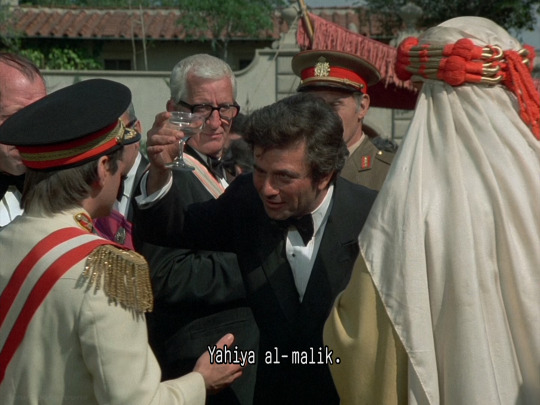
we did get some extremely jewish-sounding arabic out of peter though. so. all is emphatically forgiven
the one thing that truly rubs me the wrong way about the episode is that it's noxiously sympathetic to the american political ethos of the time, which as we well know could do no wrong. watch columbo OWN this EVIL diplomat donned in traditional garb who wants to retain his country's DISGUSTING traditional ways while the new, hip young king who was probably forcefully instituted by american troops in a coup you'll never learn about is COOL and LOVES AMERICA and will lead his oil-filled country on camelback into a beautiful sunset of BEING COOL and LOVING AMERICA. there's NO WAY this could go south. STOP looking at iran NOW
(speaking of which, the state dept. rep who bursts columbo's bubble, kermit morgan, might or might not be a nod to kermit roosevelt jr. who played a central role in the CIA's ousting of iran's mosaddegh in 1953)

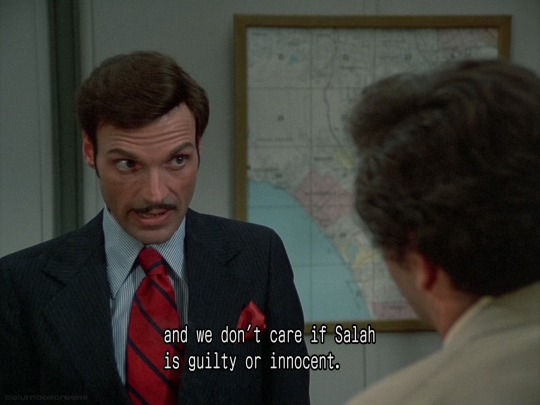
...least he's honest
anyway, in retrospect this episode isn't the series' finest moment, but it's a decent watch--and believe me, far and away not the worst treatment of arabs hollywood has thrown at us over the years. i know i'd certainly take a dozen of these over whatever the hell they were churning out post-9/11.

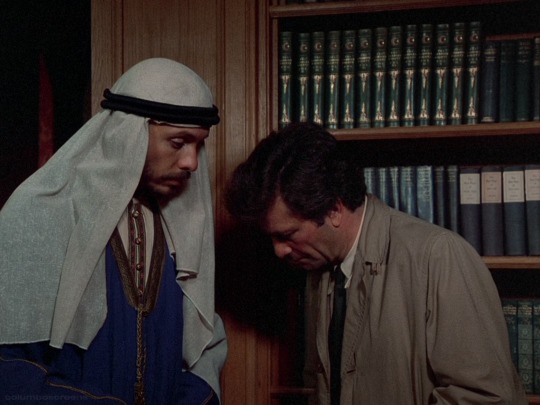
wallahi i could've forgiven the weird culturally inaccurate bowing if they just put columbo in a keffiyeh...
89 notes
·
View notes
Note
I'm maybe a bit late to the party, but I do think there's been some important American-specific context missing from the larger conversation about the Taylor Swift and Matty Healy stuff, and the fan response to it. I'm not saying the context changes the larger discussion about what politics is and what people should be trying to do, but I think it does have explanatory value for what people are thinking about, what references they might have in their head.
First, I think there are two distinct issues that have been unfortunately blurred by the broader discourse, largely because of an accident of timing. Matty Healy first appeared at Taylor's concerts in Nashville, seemingly confirming the relationship that had been reported in the tabloids (because they'd also said he'd be there). At the same time, a lot of fans who had been disappointed in Taylor's lack of explicit statement about anti-LGBTQ legislation in several of the states on her tour created an expectation or hope for themselves that Taylor would say something in Nashville about the TN drag ban, because in the past she's centered her political statements as a citizen of Tennessee. And obviously, Taylor did not say anything, and so I think you have these two largely separate things - Matty Healy and her silence on these bills - being mixed into the same conversation in ways that aren't very productive. (Tbh I personally don't find celebrities speaking out on bills like this to be very politically useful, but I also think if Taylor felt that way she probably shouldn't have publicly said the phrase 'I promise to always advocate' for protections for LBGTQ people. Like, questions of political efficacy aside, I do think there's very valid space for fan disappointment.)
So, that said, I think some part of the fan backlash Taylor is receiving is about her silence on these bills, not fans wanting her to dump Matty Healy (and some people have been very good about separating these threads of argument, some people have been deliberately combining them into a larger statement, some people have just been blurring them completely). And while I don't really think yelling at celebrities on the internet to speak up about terrible legislation is effective politics at all, I do think I kind of see where it comes from, which is where the context comes in. To make an extremely complicated story much shorter, one of the early waves of the current anti-trans panic resulted in an anti-trans bill passed in North Carolina in 2016. For complicated and largely racial reasons, organizing political action in NC is extremely difficult (also in 2016, a UNC democratization researcher declared that NC technically couldn't be considered a democracy. it hasn't gotten much better, an abortion ban was passed there just last week after an elected representative who was elected as a Democrat explicitly on a platform of protecting abortion rights abruptly switched party affiliation last month and voted for the bill, giving Republicans a veto-proof majority - it's a wild and deeply unsettling story.) However, what did happen in the wake of the 2016 bill was a massive cultural backlash - concerts in the state were cancelled, TV and film projects were moved, businesses pulled out of the state, the NCAA refused to consider the state as a potential venue for the incredibly lucrative men's basketball tournament while the law was still on the books - and ultimately the worst parts of the law were repealed in 2017 in response. A lot of young Americans at that time experienced that as a major soft power/cultural rebuke that led to actual political change, and so I think calling on cultural figures with a lot of soft power like Taylor Swift to at least say something is an attempt, if clumsy (the economic harm was much more effective than the cultural rebuke), at recreating that moment, especially as more and worse bills are being passed with nothing like that 2016 consensus response. Like I said, I don't think it substantially changes the substantive points you've been making about what is and isn't politics, but I do think it's useful for understanding the reference points young Americans may be holding in their heads (consciously or unconsciously).
Thanks for this ask anon - I found your thoughts and perspective really interesting.
You made me realise that I haven't been very curious about the calls from fans for Taylor Swift to speak about politics. It's a response to the world that combines putting a lot of emphasis on the political importance of speech acts and also really expressing desires to control what other people do - both of which I find very annoying. But this is a good reminder that even (or maybe especially) things that annoying to me are worth being curious about.
I had known a little bit about the laws in North Carolina and the backlash, but I hadn't realised that this was the lesson that at least some people had taken from it.
America is a terrifying place to be right now and the question of how to fight is a live and active one. And what really matters is that people are fighting collectively. People learn so much from trying to change the world alongside other people - and the idea that we're stronger together than we are alone is true of developing strategies as well as anything else.
I also totally get having an emotional reaction and a desire for something from the celebrities you follow. If you check my posts in the lead up to the Irish repeal referendum, or the 2019 British election - I really wanted 1D members to say 'Vote Repeal' and 'choose socialism over barbarism'. That feeling is a really normal part of being a fan and was there even though that I learned who Harry Styles was as I learned that we had nothing in common politically.
But the reason I write this is because I think it's so important that people don't let that feeling drive their political analysis (and what you say suggests that it might be).
I had an anon that said that the reason that they wanted a 1D member to speak out is that the 1D members voice was so much more powerful theirs. And that's what worries me - that people are ignoring the potential of building collective power - and instead hoping that someone who already has power will make change. And there's just no evidence that that works (quite the opposite).
There was lots of useful celebrity contributions to the American Civil Rights Movement of the 50s, 60s, and 70s. But it was fundamentally the same contribution that hundreds of thousands of people played across the US. Celebrities often had more money, and could sometimes reach particular audiences and create iconic issues. I'd never deny the impact that Aretha Franklin, or Muhammad Ali, or Tommie Smith and John Carlos. But there was work to be done in every single city and town across the US - and people did it. The actions those people took only had power within the context of hte wider movement they were connected to.
I do think it's worth at this moment looking at history and seeing how people have resisted in the past and what they've managed to do. And I think that shows how much it takes to change, and that any one person's voice can only be a tiny part of something bigger, even if they have a massive amplification system.
If I was going to sum up what I'm trying to say - there's nothing wrong with wanting Taylor to say something, but to think that whether or not Taylor says anything is politically important to the cause - is denying your own power.
#I had a side track#about what yelling at people on twitter can and can't do#based on this week's peak NZ news story#involving a Florida Zoo and a kiwi#but I think it distracts from the main point#Which is that lots of people have to come together collectively#to make change#those who already have power aren't going to do it by themselves
5 notes
·
View notes
Text
はじめまして
I have never not wanted to learn Japanese and visit Japan, so I decided to try and finally learn it! I have learned hiragana in the past so that has been easy enough to review. I will take any easy momentum I can get. I have just been playing with duolingo each morning while I wait for my meds to kick in in the morning; after that I am actually finishing my bachelors and working full-time, so most of my day revolves around those two things. I am only taking one class right now (Python), so I have a little bit of extra time. The last two terms I was taking two (accelerated, so 8-week) classes at a time but moving forward I am going to do just one at a time.
I also have the first Genki textbook and workbook, and saw good reviews for a kanji book from Kodansha? Duolingo teaches kanji, but because you’re only reviewing a handful of words at a time, I realized I was not actually learning the kanji, I was just using deductive reasoning. Like, if the kanji they taught were just out in the wild I don’t know that I would know them but within the context of the stuff in duolingo it’s like “ok, I guess it’s this one”. So I just finished unit 4, which is as far as I got last time I tried this out.
I also am low-key obsessed with Hobonichi planners, which was one of the things that started all this. I use the Cousin, which was just available in Japanese until this January. I had ordered an English one for 2023 but I actually am selling that to someone on Reddit because at the last possible minute I decided I not only wanted the Japanese one again for practice, but I also wanted the Avec again, which is split into two books. There are quotes at the bottom of each page and several reference pages in the back, and I wanted to try to see how easily I could read them by then end of 2023? Also, I hate American planner videos for the most part. My favorite Hobonichi youtubers are Japanese, and I can use the auto-translate function to get the general ideas of what is being said, but obviously that misses a lot. I also knit, and there is a huge knitting community in Japan, and it would be cool to be able to read Japanese knitting patterns. I also have a bunch of origami books that are in Japanese. There was just enough stuff that I like that intersects with Japanese culture that I felt like I had a good enough reason to learn other than “I like anime”.
Maybe in 2024 I can travel to Japan and buy my 2025 Hobonichi from Loft in person??? That’s the dream haha. IYKYK.
1 note
·
View note
Note
I had a hard time with Laura on the last episode. Her whole take on Bradley needing to cut off her brother. I don't know, it seems like such an american take to just walk away from a family member because they are having a hard time. And not very sympathetic to people who are struggling with addictions.
Oh, really? I wouldn't have phrased it like that myself or maybe not even said it to someone I still don't know that well, but I don't think her actual advice was wrong? And really, what information on Bradley's background was she missing? She's fully aware that Bradley loves her family, especially her brother, and that addiction is something where everyone's a victim, from family to the person with the addiction. None of that is new or changes on what circumstances she gave the advice.
Addiction is such a difficult situation for everyone involved, and it's understood that Bradley has already tried many, many times to help him. At a certain point, people do have to prioritize themselves. Hal's meltdown in the UBA break room, how many times has something like that happened or will happen again? Which incident would be too much? Is he owed infinite forgiveness? Addiction doesn't mean you're incapable of thinking about your actions or being held accountable. And again, the assumption is that until now, this has happened again and again, things are just now reaching a head.
And I wouldn't say this has something to do specifically with America? I know we talk a lot about the role and importance of family in the US vs outside it, especially in the context of coming out and losing them, an unthinkable choice for some of us, but. I don't think this is bad advice for anywhere? If you are being hurt by your family, it's totally fine to leave them! The discussion we tend to have is about an already existing status quo where we put up with being in the closet, with all its admittedly negative consequences, for a lot of love and care in other forms, right? But if you're, say, somehow accidentally outed and they're treating you like shit, the motivation to stay is surely diminished? Or heck, a lot of POC choose to come out because the closet is that hurtful to them and that's fine too.
It comes down to personal choice and priorities and while they can be not the same for people from different cultures, I don't think any one way is worse or better, it's more a matter of judging other ways? For the most part, in our discussions, we're not like, oh, you Americans leave your families too easily, it's more, stop judging us for wanting to keep them. And let's face it, if we're on the topic of giving up on family, we do that outside the US too, a lot of people get disowned or cut off in our pretty judgmental Asian cultures, for example :P The whole question of stay closeted or lose your family only comes up because family are willing to give up on us. It's just, we should be better about it, when it comes to being queer or this?
In terms of addiction, I'm only speaking from second-hand experience, since recreational drugs and alcohol being banned in Islam has made it such that I don't see it in my own family. What I'm going off of is, oddly enough, not even just fictional media portrayal but my friend's very thorough liveblogging of the A&E show Intervention, if you know it? These people...their lives are just wrecked by it, including family. Obviously those are the really extreme scenarios, and it would be unfair and inaccurate to apply those possibilities to every situation, but Hal isn't exactly on the milder end.
Having said all that, I don't think the way Bradley executed that advice in this recent ep was actually what I'd have suggested. D: First, get him through rehab, go ahead and make your plans? And like, if he's actively working on getting better, as choosing to go to rehab was evidence of, then why cut him out? Well, because this has all happened before and most likely will again and it hurts her each time it does, but...
It's tough, no matter what, there aren't any right answers. But I don't think what Laura said was overly harsh or wrong, still.
#lol at this essay ;_;#that is just completely irrelevant#replies#femslash related stuff#sent on 20211112#Anonymous#the morning show 2x08#the morning show 2x09
21 notes
·
View notes
Text
Three Asks
It’s been a while since we answered some asks so today and maybe tomorrow, or the day after tomorrow, we’ll collect some and answer them since we’ve gotten while a few in the last two or three weeks.
In today’s post I picked out the three most recent asks we’ve received, two of which are ones I’d usually just delete because answering is pointless but one of them showcased a popular pattern so we decided to reply just this once. So this time around the questions are about Namjoon and Seokjin, next time we’ll do ones about Tae and Jimin (and vmin), and so on.
Ask 1 - Did Namjoon have to bring up the criticism he received in 2015/16 in the Juju Chang interview?
Ask 2 and 3 - questions from either diet solos (someone who isn’t quite a solo stan just yet but exhibits the same thought patterns as solos do) or full on solo stans.
From anon: So you must have seen their interview alongside the President right on a news show? Most of it was fine and I liked how involved they were especially JK, but a point Namjoon made is what I'm kinda dicey about. He addressed that they were called out for WoH lyrics but the thing is I'm not sure if it needed to be brought up. Especially in American media and the way they contextualize things..
Obviously he meant that they grew from it but not sure if that was the way to put it I guess?
I will admit, there aren’t many times when asks that get sent to us annoy me, but this one in conjunction with the absolute nonsense that took place about this on twt just made my blood boil. Let’s look at the question and answer so we have full context when it comes to the interview and then, after that, we’ll look at the greater context of why Namjoon saying what he did is significant and a big deal.
Juju Chang: You guys are an all male band and, let’s face it, Korea, historically, has been a very male dominated culture and yet here at the UN one of the core values in Sustainable Development is educating women and having gender equality. You have a lot of female fans. What would you say to them about gender equality and working towards that?
Namjoon: Personally, I received a lot fo criticism regarding misogyny in 2015 and 2016, which led me to get my lyrics reviewed by a women’s studies professor. That experience, in turn, was an opportunity for me to self-reflect and question whether I’d been insensitive toward gender equality. I want to do the best I can to take interest in the topic, learn and make improvements. That’s my perspective now.
Namjoon used a personal story as framework to showcase that even someone like him, a man in a position of power/influence from a country which, as the interviewer explained, is very male dominated can learn, grow and, in the long run, contribute to change. It takes tremendous bravery to do something like this, to not only admit that you made such a mistake, but also to take it and grow from it, take the time to reflect and strive to better yourself to never repeat it again. And also talk about doing so not only during an international broadcast but also while your own president sits right there next to you.
Perhaps there are a relatively big number of countries in the west where equality is much closer to being a reality, where it is a core value to respect woman, one that you are raised with, but here the context was specifically BTS and their background, their country and their culture. From K-ARMY we know that things have taken a turn for the worse in Korea when it comes to women’s rights and the behavior of men toward them, how feminism is treated essentially as a dirty word and you will get hunted down for using it or for behaving in a feminist manner. Namjoon himself was placed on some list made by misogynists labeling him as a dirty, dirty feminist. The same men who even went after the military to get them to stop using a hand gesture which could, if you really want to, be used to make fun of a man for a small d*ck. In polls men in their 20s and 30s have voted being against feminism and I don’t mean just like 10 or 20% of voters, but rather 50-70%, even some presidential candidates have apparently been revealed as anti-feminists.
Circling back to Namjoon, having this context, do you now get why it was a big thing for him to say this, why it makes him a role model and why it was important to do so? Besides this isn’t just about the WoH lyrics which, to be frank, were never an actual issue but instead were made into one (the line I know that usually get’s brought up most is “The girls are equations, and us guys are solutions” which, if you think about it, actually means that boys and girls are equal since 2+5=7, the equation and the solution are the same, and also the song is satire about hormonal boys and their behavior which people have decided to ignore for the sake of sitting on their high horses instead). Namjoon wasn’t even the only member credited for the lyrics yet he took the blame upon himself, used this to better himself even though we know 2015 was an extremely dark time for him. But he is the leader, he took responsibility and he grew from it. He stands as example of how change is possible even in a country that is male dominated and misogynistic.
From anon: Reading your post about My universe I can’t but be heavy hearted.
It’s such a beautiful song but Jin not having almost any lines ruined the experience for me. He deserves so much more than being a mere backup vocal. Same goes to Jimin but I’m not as effected as Jin, since we’ve all seen a pattern there.
We know the boys decide collectively decide LD and how it fits their personalities and voices but I can’t but feel icky about Dynamite, not today, BS&T and now MY.
I truly hope this doesn’t continue and BH decides to respect Jin more as an artist. He’s one of the biggest reasons the group is where it is now.
Though I can’t say with 100% certainty that this comes from someone that has consumed too much solo stan “content”, it does very much feel like it and the only reason why I’m even answering this is that I’d like to highlight something, a pattern we've seen a million times over for years now in regard to line distribution but that is even more glaring and flawed in this case, after we’ve seen how My Universe was recorded:
“We know the boys collectively decide” and yet “and BH decides to respect Jin more”, with this you’re basically saying that you know all the members, including Seokjin, are involved BUT since giving him and the others slack for it would make you look bad, you instead throw blame at BH, which in this case had no say in the line distribution. That choice was Christ Martin’s to make. If you already complain about line distribution, at least have the guts to direct your hate at the people you just said yourself make the choice--the members. Solos already belittle Seokjin’s efforts as it is, and constantly demand an acting debut of him which basically, to me, just comes across as them wanting him to act because they don’t value his singing and music, so would it be really that farfetched for them to also hate on him for, what, not speaking up and demanding more to satisfy you?
Seokjin was so happy and excited while recording My Universe, while meeting Chris Martin, someone he’s admired and been a fan of for so long. He gave his best while recording and sounded absolutely marvelously, and yet instead of celebrating him, his voice, and what we do hear of him, you just focus on the negatives.
BH isn’t perfect by any means, don’t even try to come into our asks calling me a company stan or whatever because I’m far from it, but in this case they had nothing to do with it. Coldplay and Chris Martin did. We saw all the members record the chorus, and we heard it, we saw and heard Seokjin sing absolutely beautifully and get praise for it, and we saw how happy this collab has made him. Why can’t you just let this be a happy time, why must you immediately search for things to be negative about?
Would I have liked so hear more of his voice on My Universe? Obviously, I even said as much in my post about the song. I love Seokjin and his voice a lot, he is my bias wrecker for a reason. But the song has already happened, been recorded, mastered, and released. What will a negativity parade change? What? Absolutely nothing except for make him feel bad because you can’t just say “Seokjin did amazingly, I love his voice”, no, you have to go around yelling “OMG he is being cut from the song because BH hates him”. What does that do for him? Like really, tell me, because I don’t get it.
And if my opinion isn’t valid enough for you, it is, after all, just an opinion, take Seokjin’s opinion about the collab instead:
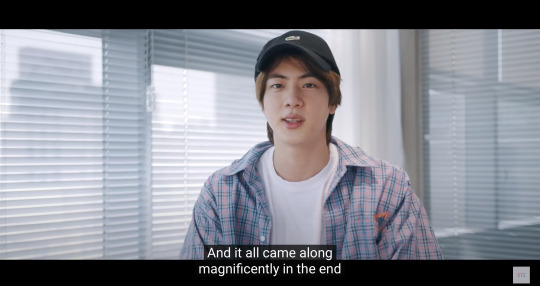
Or asks such as this one:
From anon: I honestly can’t wait for Seokjin to go solo one day. Go where he’s appreciated for his talents and musicality, not cuz he’s just a ��hyung” or “comic relief” or “WWH”.
Where, tell me, has he ever expressed an interest in going solo? No, I’m serious, where, because all I know is that he is happy with his members, with what he does, that he enjoys making music and getting more involved than he used to. Just the other day during the interview with Juju Chang he spoke about how he misses the old times where he could go for soju and food with Yoongi to spend some time together.
And just a few years before that Yoongi said that Seokjin has been good from the beginning, and there are tons of other examples of the members praising Seokjin in terms of his voice and musicality. When he was going through burnout last year, Bang PD encouraged him to channel his thoughts and feelings into music, recommended him a producer he thought work well with him, and Seokjin said it really did help him. And we got Abyss as result from it all, a gorgeous and raw song.
Yes, he gets praise for being a good hyung, because guess what, he is a good hyung. Maybe for you that’s not good enough, but he’s proud of it, has always taken the fact that he’s the eldest seriously even when goofing around with his members. How is that a bad thing?
Seokjin loves his members and they love him. Seokjin loves ARMY and we love him back tenfold. Just because solos hate the members and aren’t satisfied with Seokjin, how is that my issue or even his? If you’re a genuine fan of his, support his hard work, support all his contributions to BTS’ music, their performances, their dancing, and everything else. Because he is part of BTS regardless if you like it or not, and as far as we are aware, he doesn’t plan on changing that any time soon, or at all.
36 notes
·
View notes
Note
Legal question, what would exactly qualify as an accomplice to murder change, legally? Because I've been translating a JP article on the punishments all trilogy crimes would receive under JP law, and Lana and Iris aren't referred to as accomplices in it, just guilty of evidence/body tampering.
Oh boy, I guess this means I'm the person the Ace Attorney fandom comes to for law info now. Thank you for the honor. I do want to clarify that I'm not even in high school pre-law, I just like learning and so end up watching a lot of youtube videos/podcasts from lawyers.
That out of the way, when you help someone commit a crime in English Common Law you're either an accomplice or an accessory (generally after the fact). An accomplice is there at the crime as is punished equally. An accessory assists before or after the committing of a crime. So with US standards, Lana is an accessory to the crime while Iris could be either an accomplice or an accessory.
The thing is that accomplice and accessory generally covers actions that aren't crimes alone, but assists in the principal's (culprit's) crime in context. Being a lookout or driving someone from point a to b isn't a crime, but it is when you knowingly do it in aid of a criminal act. However if as an accessory you also commit a criminal act, you are charged with that act as well. So if Godot gets charged/convicted of Misty's murder (something that's shaky), Iris gets a small part of his guilt as an accessory (or all of it as an accomplice) as well as a seperate charge for obstruction of justice/tampering with/fabrication of evidence. However this depends on the jurisdiction. Some US states have gotten rid of accessory all together and just introduced new crimes like laws against helping another evade arrest. It all depends on the specific state.
However, intricate layered American law is all inconsequential here. The Wikipedia articles for accomplice and accessory I've been using to supplement my memory of things like Legal Geek episodes are both tagged as subpar, with accomplice having multiple issues. However there's an interesting phrase in the article "Under the English common law, an accomplice". This leads me to believe that the idea of an accomplice, who shares equal guilt, is exclusive to common law. Japan, obviously, is not a common law country. The little paragraph about criticism regarding doctrine being too draconian further leads me to believe that such a thing doesn't exist everywhere.
So time to figure out Japanese law. Unfortunately, there are very few English language resources on Japanese law. However the entire penal code has been translated into English. Of course I might be missing some important case law, but my reading on the Japanese legal system on Wikipedia indicates that precedent doesn't form any support beams in the criminal system like it does in the US. So let's go to Chapter XI Complicity
(Accessoryship) Article 62 (1) A person who aids a principal is an accessory. (2) A person who induces an accessory shall be dealt with in sentencing as an accessory.
(Reduced Punishment for Accessories) Article 63 The punishment of an accessory shall be reduced from the punishment for the principal.
The penal code does make mention of accomplice in this section
(Complicity and Status) Article 65 (1) When a person collaborates in a criminal act in which the status of the criminal establishes the criminal's punishability, the person is an accomplice even without such status.
Status has a little pop-up that says "status : 身分(みぶん), 地位(ちい)[原則] / same status, 資格(しかく)[地位としての資格] / status of residence" so I assume that's what it's talking about.
Speaking of pop-ups, many of the words in the code have Japanese pop-ups, which I assume give details on what specific word is being translated into English terminology. Because translating laws can be awkward. I recommend reading the penal code on your computer, even if your Japanese isn't good enough to parse legalese in it. There's also an alternating Japanese-English display mode on the website. However, the word "accomplice" doesn't have a pop-up. On accessory it says "従犯(じゅうはん), 従物(じゅうぶつ)[動産]". Which leads me to believe that the word translated as accessory is actual legal terminology, while accomplice is a generic term in the original text that just means "someone who helped with the crime".
So if my analysis is correct, Lana and Iris could be charged as accessories, the contents the article could be explained by being standard practice to only do so when the accessory hasn't committed another crime. Chapter IX Article 54 of the penal code might be relevant here.
(Concurrence of Crimes) Article 54 (1) When a single act constitutes two or more separate crimes, or when an act as the means or results of a crime constitutes another crime, the greatest among the punishments prescribed for such crimes shall be imposed.
But I feel like if that's the case, a good article would explain why they're being charged as for their actions vs being an accessory. But many the article does that, and you're only confused about why the author hasn't said anything about them being charged as an accomplice. Which they didn't bring up, as that's not a Japanese concept or something even present in the Japanese pop culture legal knowledge.
I hope this helps and is more or less accurate. I'd love it if you send me the article when you're done translating. I haven't seen any English language posts about real life punishments from a Japanese perspective.
12 notes
·
View notes
Text
Kyidyl Explains Bones - Part 4.1
(These are all under the KyidylBones tag.)
Sorry for the pause in this series....it’s difficult to produce these when I don’t have my meds and I ran out. But I refilled them, so now we continue!
Anyway, today we’re covering something that is, if possible, even more complex and thorny than sex determination: race determination.
Ethical Statement: Race is not a biological reality. Now, hear me out before you run away. Race isn’t a biological reality, but that doesn’t make it *not real*. Race absolutely is real and effects how society interacts with an individual. But between these two statements, which gives you more information about a person:
“I’m white.”
“I’m white and I live in 21st century America.”
The second, obviously. Because skin color tells us virtually nothing about an individual. Ethnicity - where they’re from, what social groups they might have interacted with, how society might have treated them, etc. - is a lot more valuable than knowing the color of their skin. HOWEVER. And this is a big however. However, in a modern person’s understanding there is a lot of crossover between race and ethnicity. And, in fact, as with sex, when a set of remains is being evaluated for identification we must at least attempt to identify the race because that’s how they’ll be categorized in the missing persons’ database. And identifying race in archaeological remains helps us track human social interaction and migration because ethnicity doesn’t really survive intact outside of grave goods (and those may or may not be present.). And, yes, if you’re wondering, DNA tests can confirm a lot of the data that we attempt to glean anatomically but for the most part we don’t have the money to do DNA tests on remains, or they don’t have anything surviving that has intact DNA (you can have a nearly complete set of remains and not have any DNA because damage to the outside surface of the bone and/or teeth causes damage to the DNA inside it and causes it to break down.).
So since race isn’t a biological reality but it is a social reality, it’s helpful to attempt to determine the race of the individual in question. And, obviously, that’s before you even take into account that people interbreed all the time. So how can we begin to do this with any degree of accuracy, since the classifications are social and not biological?
Short answer: we can’t, but we try anyway because of the reasons I mentioned above. And there’s something that I should have added to the post about sexing a skeleton but I didn’t because I’m human and I make mistakes sometimes: we don’t ever refer to a set of remains as definitively X sex or definitively X race (well, we do when we’re with other scientists who have an understanding of what I’m about to say for brevity’s sake.), we say “this individual has _____ features consistent with or indicative ______ race/sex.” Sometimes the features are very stereotypical and we’re fairly certain that they definitely are X race or sex, but other times they’re not. And the markers that we use are based on averages, so obviously within those averages there’s a huge amount of variation - that’s why we use so many different markers. So like with any science, it’s good to remember that there’s always room for change and that it’s all theories.
Also if you want to do some reading on it, you’ll see that these determinations are still hotly debated among anthropologists because we are well aware of how racist and shitty it all is and we hate that we have to engage in it but at the same time it’s important for the reasons I mentioned above, so we’re always trying to find new ways that are more accurate and less racist.
Categories
Essentially, we have a list of anatomical features that tend to be similar in geographic regions and we go through these features and grade them according to which race category we think they most closely match. There are three, sometimes four, categories:
Caucasoid/White/European depending on what reference you’re using.
Black/African (Outdated term: Negroid. We all hate it but it’s in the literature, especially older stuff, and if you do any reading you’ll run into it.)
Asian (Outdated term: mongoloid. Same as above.) - This includes Native Americans because their anatomy is so similar to Asians, especially eastern asians, that it’s well-nigh impossible to distinguish without a DNA test. Mostly we know based on the context the remains are found in.
Aboriginal - This is specifically for indigenous pacific groups, especially in Australia and Aotearoa (New Zealand. In this lab we use the indigenous name.). They have some interesting anatomical differences that are only found in that area of the world. Obviously it’s not going to be as used in the rest of the world tho so it’s often not covered. Plus their biggest differences are brow bone size and tooth size so while it’s different it’s not AS different as the other three categories.
So as we go through the markers, we add them to these groups and then at the end average them out to see which one the remains most resemble.
The Anatomy
There are a lot of markers of race on remains, and more are being studied all the time, so I’m going to cover the most common ones in the interest of length. Also, pretty much all race markers are on the skull, so I’m not really going to get into the rest of the skeleton, even tho there ARE markers on the post-cranial (means exactly what you’d think: not skull.) skeleton. And like with physics ignoring friction for the sake of illustration, we’re going to ignore cultural changes to the bones ala the slavic squat and pathologies. We’re gonna start in on the bone pics in a hot second, so time for a cut.
I went back and forth on the most concise, easy to understand way of doing this and it took me a bit to figure it out, but I think it’s going to be like this: I’m going to tell you what we look for generally, and then give specific examples in each category as we go through race by race. So, there are a lot of things that can indicate race in a skeleton, but I’m only going to cover the easiest to digest. Understand though that there’s a lot of smaller indiciations. Like with sex, these are graded on a scale in relationship to how stereotypical they are of a given feature. And, unlike with sex, it’s much easier for the opinion and biases of the examiner to alter the results because a lot of these comes down to “what shape is this thing and which shape is it closest to”. This is, of course, subjective. The ones I’m going to cover are:
Eye orbit shape and sharpness.
Prognathism (the amount that the “muzzle” area of the face sticks out. Eg., how flat is or isn’t a face?)
Nasal shape
Nasal sill (this is the bit that sticks out at the bottom of your septum, and the “floor” of your nose/top of your maxilla in your nose.
Nasal bridge
Unique racial features.
First, I’m gonna use some screenies from my ipad to be very specific about the area of the skull I’m talking about here. These all were taken by me in essential skeleton and edited.
Eye orbit shape:
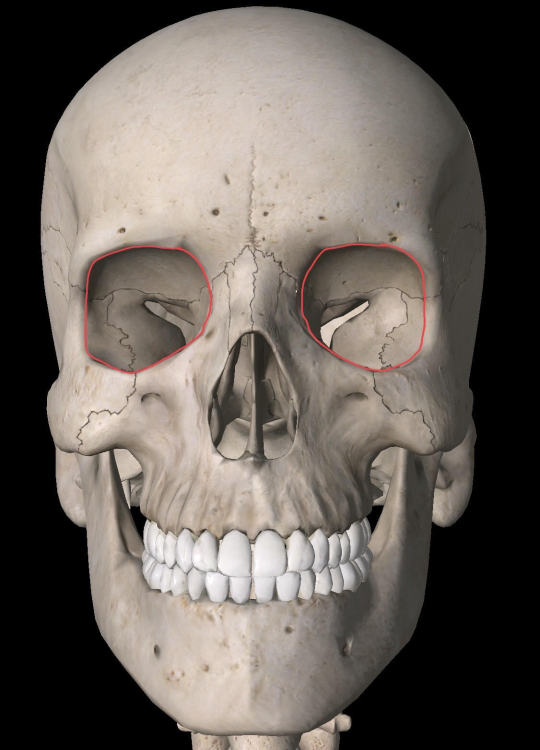
I think this one is one of the more accessible things to understand without a skull in your hand. If you think of the way that people look IRL, there are physical features that tend to be more common in various populations, and that translates to the skull (and in case you’re wondering: no, white is not treated as the baseline here, but you’ll see.). Here it’s the shape of the eye socket.
Eye socket sharpness:
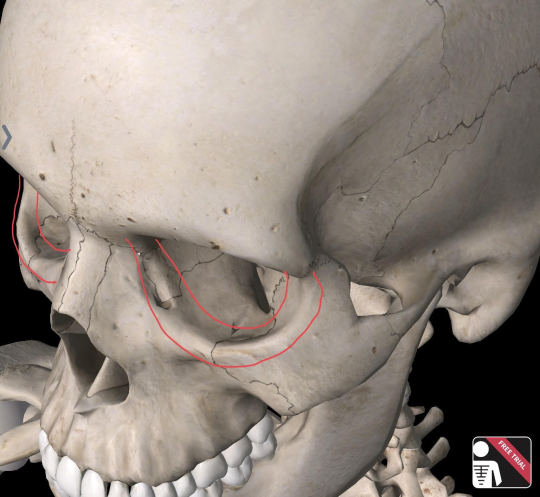
When you hold a skull in your hand, if you run your finger over the part of the eye socket between the lines (really, the whole edge, but the effect is more pronounced at the bottom and on the lateral edges), it’s sharper on some races than on others. Again - this is a skeletal marker of physical features that you can see in a living person. I’m not going to point this out in the example skulls because you won’t be able to see or feel it in the images, but it’s a pretty easy to understand way of adding another racial marker to your tools.
Prognathism:

So the easiest way to understand this is twofold. First, how far does the chin stick out in relationship to the top of the nose? This shows how far the face protruded in life. Here you can see the angle is 88 (although honestly i’ve never known anyone to measure this - I’m using it to illustrate the point.), and I only know that because the ruler tool I used to draw the lines told me so, lol. The easiest way to see this is to look at the curve of the profile like I’ve illustrated with the green line.
Nasal Shape:
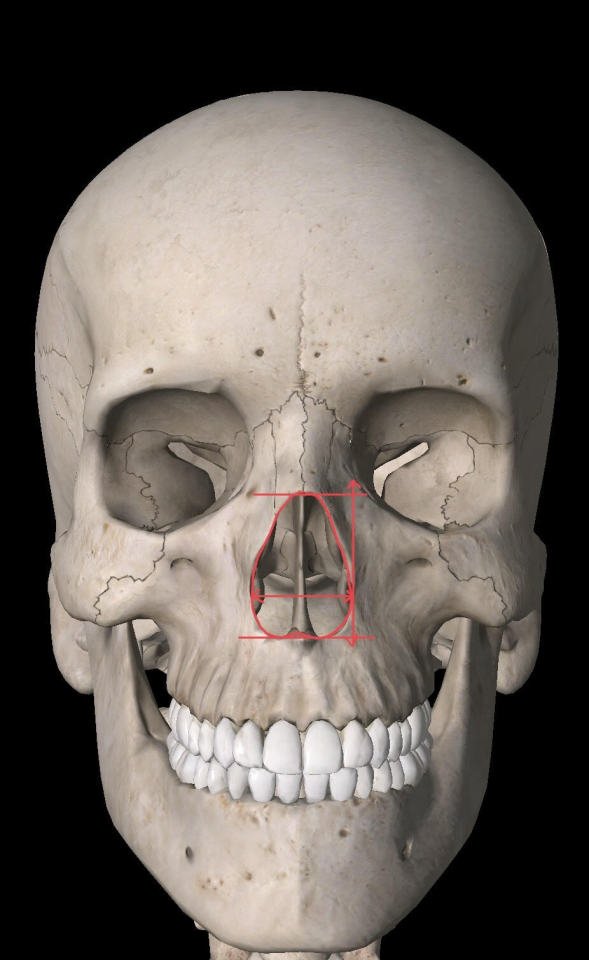
The shape of the nasal opening varies between racial groups. We look at the height and width from the places I’ve illustrated above. Sometimes we also look at the shape of the sort of upside down heart area I’ve outlined, because human variation means that you’ve gotta have a couple of ways of doing things.
The Nasal Sill gets two images cause it has two parts:
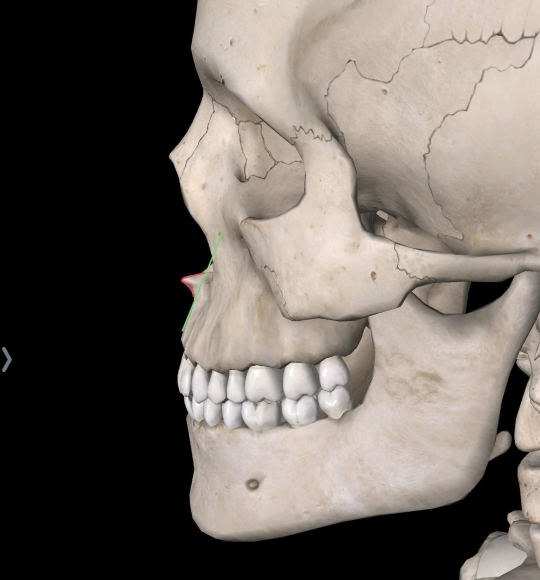

The top one has a landmark called the anterior nasal spine highlighted (honestly I think of it like the pointy nose thing). The degree to which it sticks out varies by race. It is part of the maxilla, and together with the two portions of the maxilla that i’ve circled forms the nasal sill. A lot of textbooks refer to the nasal sill as having a “height”. I found this confusing and I found the pictures confusing too, so I’m gonna try a different tactic with you guys. So first of all, you can feel some of these bones in your face. Pinch the bottom of your septum where it meets your upper lip and wiggle it. Feel how there’s a harder bit under the cartilage? That’s the pointy nose thing...er, nasal spine. Now - and this is a little gross but it’s ok I won’t tell anyone - if you feel down into the bottom of your nasal passages you can feel where this blends into your maxilla. The cartilage rises up and that forms your nasal passage. On a dead person, that cartilage isn’t there. So the hard bone that you feel there is all we have. Well, the angle at which that slopes deeper into the nasal passage varies by race (because nose shape varies by race). In some individuals, the anterior edge of that opening is sharp and lifted, forming a sort of dip in the area I’ve circled above. This is the nasal gutter. And if you google that, you will be hard-pressed to find anything that explains it with any clarity, especially because you don’t have a skull in your hand. But it’s one of those things that’s useful to know because it can be really distinct and easy to see the differences in.
The Nasal Bridge:
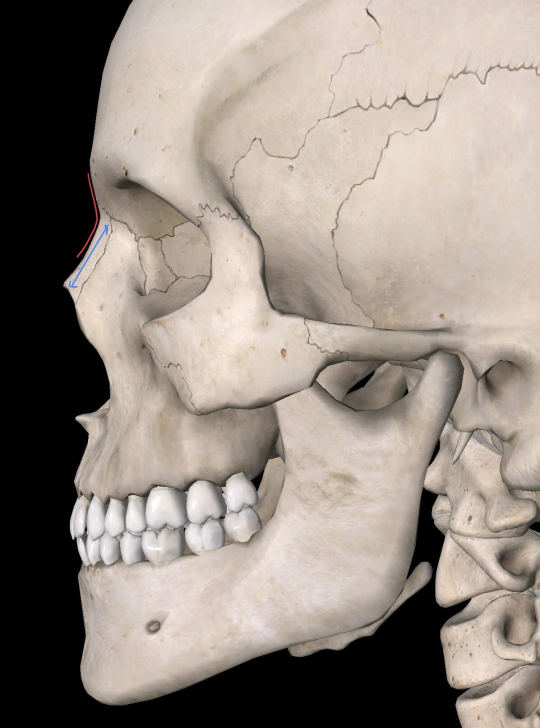
Because the shape of the nose changes the bones all around it, another indicator is what I’ve shown here. The angle of the curve of that red line, and the length of the blue line. That’s basically the length of the nasal bones. You can also tell with the shape of them, and the shape of the place where they connect to the frontal (the suture that connects them to the brow bone.), but I’m not going to cover that. We have enough nose things.
I’m going to cover unique features when I get into the examples of different races. You might be thinking that this is a lot of attention paid to the eyes and nose, and you’d be right, because although there are distinct differences in mouth shape and size they don’t translate to the bone. And, fun fact, the most accurate indicator of race is actually teeth - but we’ll cover that in the entry on teeth. But for now, I’m going to stop here and split that into its own post because this one is long and picture-heavy. So come back in a couple hours after I’ve finished and posted that one.
#KyidylBones#race#skeletal anatomy#forensics#science#anthropology#archaeology#archeology#bone#human bone#interesting things#skulls#humans
16 notes
·
View notes
Text
why i disliked “the traitor baru cormorant”
so...recently i read Seth Dickinson’s The Traitor Baru Cormorant. i bought it thinking, Cool, an insightful fantasy series for me to get into while i wait to hear whether i passed my qualifying exams! i have some time before the semester starts!
and then i absolutely hated it and spent every minute cataloguing what i thought Dickinson got wrong.
...uh, if you want to get the tl;dr of the liveblog i gave the gf, here’s the top three reasons i disliked this book:
1) not a fan of the “strong female character” trope
yes, Baru doesn’t sling around a sword or shoot arrows better than Anyone In The Whole World. but Dickinson IMMEDIATELY tells us (not shows, tells) that she’s good at math, she’s clever at picking apart strategic scenarios, she’s a savant. (tbh, i don’t love how he shows this, either, with the standard child-prodigy-who-catches-the-attention-of-a-powerful-adult trope.) in Dickinson’s crafted world, her math skills aren’t entirely unusual: women (for...some reason?) are stereotyped as being good at calculations, despite also being aligned with hysteria and too many emotions. this bothers me more than it’s probably supposed to, because the sexism in this novel doesn’t really seem to follow an internal logic. i guess it’s so we can have a woman as the protagonist? also...hoo boy...her “savant” characterization bothers me because...she’s heavily coded as South East Asian (...maaaybe Philippines or Native Hawaii, but as i’ll get to later, Dickinson doesn’t make a huge distinction). uh...model minority stereotypes anyone? yes, within the text, plenty of people associated with the Empire comment that it’s impressive someone of her background got into a position of power so young. at the same time, i’m sure that sounds familiar to so many Asian-identified people! the constant tightrope of being expected to perform to a certain (white, Western) standard while also being Othered. mostly this bothers me because Baru is also characterized as...a sellout for the Empire. sure, her stated goal is to undo the Empire from within, but [MAJOR SPOILERS] in the end it appears that her actual goal was to attain enough power that the Empire would let her be a benevolent dictator over her home island? and it’s only after a major PERSONAL betrayal that she revises this plan? [END SPOILERS] Baru also assimilates without much pain or sacrifice. she hardly ever thinks about her parents or her childhood home. she willingly strips herself of cultural signifiers and adapts to Empire norms (apart from being a closeted lesbian, which...yeah, i’ll get to that, too). and it’s not that Dickinson doesn’t TRY to make her a nuanced character, but...to me, it feels so painfully obvious that this is not his experience. it feels almost...voyeuristic.
...much like his descriptions of wlw desire!
2) we get it, you read Foucault
the categories of sexual deviance are based entirely on a Western Victorian-era medical discourse around non-heterosexual forms of desire, but Dickinson ignores the network of sociocultural, religious, and historical contexts that contributed to that specific kind of discourse. he uses the terms “tribadism” and “sodomy” but those ideas CANNOT EXIST outside a Euro-American Christian context. yes, a huge part of the 19th century involved the pathologization of sexual and romantic desire (or lack thereof). but that in turn goes back to a history of medicine that relied on the “scientific method” as a means of studying and dissecting the human body--and that method in itself is a product of Enlightenment thinking. Theorist Sylvia Wynter (whomst everyone should read, imho) discusses how the Enlightenment attempted to make the Human (represented by a cisgender, heteronormative, white man) an agent of the State economy. every categorization of so-called deviance goes back to white supremacist attempts to define themselves as ‘human’ against a nonwhite, non-Christian Other. and IN TURN that was ultimately founded on anti-Black, anti-Indigenous racism. at this point it’s a meme in academic circles to mention Foucault, because so many scholars don’t go any further in engaging with his ideas or acknowledge their limits. but SERIOUSLY. Dickinson crafts the Masquerade as this psuedo-scientific empire that’s furthering erasure of native cultures, but...where did these ideas come from? who created them? what was the justification that gave them power? [MINOR SPOILER] blaming the Empire’s ideology on a handful of people behind the Mask who crafted this entire system makes me...uncomfortable, to say the least. part of what gives imperialism its power is that a lot of ordinary people buy in to its ideas, because it aligns with dominant belief systems or gives them some sense of advantage.
also speaking of cultural erasure...
3) culture is more than set dressing
again, to reiterate: Baru does NOT think back to her childhood home for longer than a couple passing sentences at various points in the narrative. but even though the early chapters literally take place on her home island, i don’t get a sense of...lived experience. this is true of ALL of the fantasy analogues Dickinson has created in his Empire. i felt uncomfortably aware of the real world counterparts that Dickinson was drawing inspiration from. at the same time...there are basically no details to really breathe life into these various fantasy cultures. i HATE the trope of “fantasy Asia” or “fantasy Africa” or “fantasy Middle East” that’s rampant among white male sff writers. Dickinson does not get points from me for basically just expanding that to “fantasy South East Asia,” “fantasy Mongolia,” “fantasy South America,” and... “fantasy Africa,” plus some European cultures crammed in there. he’s VERY OBVIOUSLY drawing on those languages for names, but otherwise there’s no real sense of their religious practices, the nuances of their cultures, the differences between those cultures (besides physiological, which...oh god). part of that is probably supposed to be justified by “well, the Empire just erased it!!!” but that’s not an excuse imho.
also...in making the Empire the ultimate signifier of the evils of imperialism...Dickinson kind of leans into the “noble savage” stereotype. Baru’s home island is portrayed as this idyllic environment where no one is shamed for who they love and gender doesn’t determine destiny and there are no major conflicts. (there is a minor nod to some infighting, but this is mostly a “weakness” that the Masquerade uses as an excuse to obliterate a whole tribe.) Dickinson justifies young Baru’s immediate assimilation as her attempt to figure out the Masquerade’s power from within, but given that the Masquerade presumably killed one of her dads and her mom maybe advocates a guerilla resistance...it’s weird that Baru basically abandons her family without a second thought. yeah, i get that she’s a kid when the Masquerade takes over the island, but...that’s still a hugely traumatic experience! the layers of trauma and conditioning and violence that go into this level of colonization are almost entirely externalized.
(later it’s implied that Baru might qualify as a psychopath, and tbh that feels like an excuse for why we haven’t gotten any sense of her inner world, not to mention kind of offensive.)
this isn’t exhaustive but...
it’s not that i don’t think white people shouldn’t ever address POC experiences in their books. just...if your entire trilogy is going to revolve around IMPERIALISM IS BAD, ACTUALLY, maybe you should contribute to the discourse that Black, Brown, and Indigenous authors have already done. reading this book made me so, so angry. i did not feel represented! i felt like i was being talked down to, both on a critical theory level AND on a craft level. there are SO MANY books by actual BIPOC and minority authors that have done this better. N.K. Jemisin’s Broken Earth Trilogy and her current Cities series. Nnedi Okorafor’s Binti trilogy. Leigh Bardugo’s Ninth House remains one of the more powerful novels i’ve read on how The System Is Out To Destroy You, That Is The Point. (Bardugo is non-practicing Spanish and Moroccan Jewish on one side of her family, and her character Alex is mixed and comes from a Jewish background!)
...
there’s not really a point to this. i get a lot of people have raved about this book. good for them. if that’s you, no judgment. i’m not trying to argue IF YOU LIKED THIS YOU ARE PROBLEMATIC. i’m just kind of enraged that a white dude wrote about a Brown lesbian under a colonial empire and that THIS Brown lesbian under a colonial empire couldn’t even get behind the representation. also kind of annoyed that it’s the Empire of Masks and Dickinson either hasn’t read Fanon or didn’t see fit to slip in a Fanon reference, which like. missed opportunity.
#meta#book review#maybe y'all can get enjoyment from my rage#also i don't want to publish this on like. goodreads.#i'm not out to destroy Seth Dickinson personally#i know this was a highly reviewed book#i just...hated it#and i figured putting the rage on my blog is less harmful#than leaving a one star review#while also maybe giving someone the insight#for why they might not want to read this#the traitor baru cormorant#the masked empire
13 notes
·
View notes
Text
1180
The last time you washed your hair, did you use conditioner? Yeah, I’m pretty paranoid and always feel the need to use conditioner because of a bad rebonding job from like a decade ago that stiffened up my hair as soon as it would get wet. It lasted for around a year, so I formed the habit of always using conditioner every time I shower. I don’t think I’ve ever used just shampoo since then.
Do you prefer light or dark jeans? Dark, but I suppose it would be nice to start experimenting with lighter shades as well.
When you listen to music, do you generally sing along, or just listen? It depends if I know the lyrics or I’m feeling the song at the moment. Obviously with my new obsession with BTS I can’t really sing along to entire songs, but I do sing the few English lyrics they have per song, hahaha.
Do you have any of your exes as friends on Facebook? Yeah but she’s been muted for like half a year already, as is the rest of her family. I do have plans to unfriend her entirely; I’m just not sure when I would push through with it, and I already gave Angela permission to log onto my account one of these days to be the one to do the unfriending.
Who was your first love? Do you ever miss that person? Gabie. I miss the friendship sometimes; I don’t think I’ll have a friendship as deep and connected as the one we had, so I will always feel sorry about how that went to waste. But I don’t really think about our relationship anymore as I’m pretty good at blocking off certain memories, so I don’t miss her in that sense.
How many cars are parked at your house right now? Two.
Do you have any Italian ancestry? I highly doubt so. If anything there’s probably a tiny drop Spanish blood in there but that’s the most European I’ll ever get.
Do you prefer water to be ice cold or at room temperature? Like, drinking water? Ice cold, always. I hate warm water.
Has anyone ever told you you’re a control freak? Not to my face, but I know I’m one so I’m sure other people have said that about me at least behind my back.
Do you know anyone who has gone missing? If so, were they ever found? Yes, my friend Mik and one of my aunts. They were both found eventually.
What was the spiciest thing you’ve ever eaten? Eating ghost pepper instant noodles was a pain I would never want to go through again...I threw that shit out after my first forkful, lmao.
Do you need to talk to someone? No, not in particular. In a more general sense I do wanna start gaining more friends though, so I’ve been meaning to expand my circle by creating a new Twitter account just for my BTS dump. In other words, I am a 23 year old with a stan Twitter HAHAHAHA
Is something confusing you at the moment? No, I’m good.
When was the last time you had a real deep chat? Maybe my conversation with Andi a couple of nights back. We were talking about a tricky situation with their ex-friend who turned out to be a real dick when they came out to him a year ago, and they just wanted to get my perspective on how I would handle it.
Who did you last see on webcam? The PR manager for one of our clients, who we all despise because he doesn’t know how to do his job. Thankfully he’s resigning soon so we’re all just waiting for him to leave and finally meet a much more competent replacement.
What’s your best friend’s pet’s name(s)? Angela has two dogs, Hailey and Kennedy. Andi had Apollo, who I wanted to meet so badly but sadly he passed away a week ago at 15.
Have you ever taken a picture while laying in the grass? There are photos of me sitting on grass, but not lying in it. I would imagine that would feel very prickly and uncomfortable.
Who’s your favorite Disney character? Baymax or Flynn Rider.
Have you ever deliberately tried to get someone drunk? I’ve made my friends chug drinks or down shots and it’s happened vice versa, but it was always in good fun and we never made each other harassed from it. It’s just your typical college rambunctiousness, and if anyone felt uncomfortable or iffy then we didn’t hesitate to move on.
When was the last time you used a pay phone and who were you calling? I’ve only ever seen those in my first school, when I was in kindergarten. I never got to use it and they also took them out not long after.
Do you like being kissed on the neck? Yessssssssss
Have you ever had sex with someone you weren’t dating (but had feelings for) in the hopes that they would ask you out later? Nope. I don’t think I would have sex with anyone I wasn’t dating.
What’s the most you would be willing to spend on a good bra? Probably a couple thousand bucks if I thought I looked good in it.
Do you have any of your teachers’ personal cell phone numbers saved in your contacts list? I don’t think so. I never tried getting close with any of them, and I always tried to stay hidden as much as possible. I was just in class to get good grades and pass.
Do you ever stalk peoples’ personal blogs, even if you don’t know them very well? I never really scroll through people’s Tumblrs anymore. That was more of a thing I did in like 2013, but these days going through my dashboard is enough.
What’s one thing about today’s generation that you just can’t stand? Some social media trends done for clout make me revolted, especially when it has anything to do with wasting food. I also hate when they do extreme pranks that I know I wouldn’t find funny if I were ever the victim, like tossing someone’s phone into the ocean.
Be honest: how do you feel about abortion? Pro-choice.
Is there anyone you currently want to reach out to? I would love to catch up with Katreen at some point, but I know we’re at different points in our lives now and it would probably never happen.
What is your favorite piece of art you own? I commissioned my sister to make an artwork of the 2D1N cast, and she did a great job making it! I haven’t gotten to use it or promote it yet, but I will soon. It’s really well-done.
What’s the one thing you apologized for this month? Replying late.
My favorite color is ______? Pastel pink.
I wish I had _____? Longer weekends.
What did you buy today? Nothing – I’d call that a success lmao, I’ve been spending money as if I had a million fucking bucks over the last week. I did have some packages arrive today though: my own copy of 2 Cool 4 Skool (my first physical BTS album!!!!!!); the official poster from their album BE; the Ivy Park sneakers I ordered earlier this month, and an Ivy Park bucket hat Bea had apparently gotten for me as a birthday present.
What has challenged your morals? Vices.
What made you pick up the last book you started reading? I had to read it in preparation for a one-on-one session with my employer’s CEO.
What about your life concerns you the most? Whether a stable future is in the cards for me.
What do you find particularly offensive? Would you say you’re easy or difficult to offend? Probably Filipino-American comedians or influencers who use stereotyping of Filipino accents and habits as a punchline; they do more harm to the culture than good. I can tell you not one Filipino who lives in the Philippines actually finds those funny, and Bretman Rock is probably the only personality who’s able to flaunt the culture in an entertaining and hilarious yet classy way.
When it comes to being offended, I guess it depends on the context. My humor can get pretty dark and low-blowy, but I would have a problem with someone who I know has genuinely problematic views.
What was the last series you finished watching? Do you have any plans to begin another? I think it may had still been Start-Up from last December. I’m not too big on Korean dramas since I find one episode waaaaaaayyyyyyy too long. I don’t think I’ll be starting on anything soon, Korean or otherwise.
What is one way in which you are different from a year ago? What is one way in which you are still the same? I’m single now, for the first time in technically six years. I also think I’m doing better and happier, breakup notwithstanding. OH and I love wasabi now, hahah. As for what’s unchanged, I still like taking surveys and I’m still stuck at home, though the latter’s not really in my control anymore.
If you could learn about anything without the stress of grades or cost, what kind of classes would you take? I’d just go back to UP for the free tuition. We also have the widest range of programs out of any university in the country, so it’s a damn good deal.
Name a song you’ve listened to today? Fly To My Room - BTS
When you were younger, did you have a swing set or a playhouse in your backyard? We didn’t; but one of our relatives that we’d regularly visit did have a playground that I’d use all the time. It’s still there, just very unmaintained since no one uses it anymore.
Is your mall nice? Which one? We have five different malls nearby lol. Mall culture here is on another level.
Do you have a Sonic near you? If so, what’s your favorite drink from there? No. I’m not so sure what they serve there, either. I’m guessing milkshakes?
Will you be voting in the presidential elections next time around? I’ll always exercise my right to vote.
How do you feel about chocolate-covered strawberries? I hate strawberries and I hate fruits, so even if you coat that shit in Nutella and cookie butter and chocolate syrup I still wouldn’t touch it.
Did you ever stop having feelings for someone and then started having those feelings again for them? No.
Do you hate the last guy you had a thing with? I’ve never had a thing with guys.
To whom did you last give the finger? I haven’t had to do that in a while.
What was the last musical instrument played in your presence? My sister’s keyboard.
Do you like sprinkles on your ice cream? Not particularly. They make things look cute, but they never taste like anything tbh so I never saw the point in paying extra just to have them on my desserts.
Honestly, have you ever crashed a party before? Nah. I cringe thinking about that.
Do you know how to do the moon walk? I don’t.
Has anybody ever told you that you have a good singing voice? Never gotten that specific compliment before because I know I don’t have one.
Onion rings or french fries? Onion rings.
Has anybody ever described you as a heart breaker? No.
Has anybody ever told you that you talk too fast? I don’t think so, but I know I have the tendency to do so occasionally, especially while I’m presenting a deck. Once I notice it I make an effort to pace myself.
Who is the best cook that you know? My dad and both my grandmas all deserve that title.
Which meal throughout the day do you skip the most? I literally never have lunch ever.
What’s the largest amount that you can juggle at one time? I can’t juggle.
What was your favorite thing to go on at the playground as a kid? Sandboxes, since I liked the texture; the sandboxes in school were also often empty, which worked well for my introvert self. I find that it’s carried over to today, since I still enjoy touching things like slime and kinetic sand.
Do you know how much you weighed at birth? How much? I think 5 or 6 lbs, I’m not exactly sure but it’s definitely somewhere in that small range.
Which aspect of your daily routine takes the most time? What do you do? Work, for sure. I work a normal 9–6 so that’s already 8 hours out of my day, but I also OT a lot after hours, and I work throughout my lunch break as well so that technically makes it 9 hours. I also like getting up earlier and starting some work before my shift so that I would have less tasks on my plate for the day.
Do you enjoy buying gifts for others, or could you do without this? I LOVE getting people gifts. Food is especially my love language, and I always get food delivery for my friends, family, and my team at work.
What is one thing you are expected to do, if anything? I mean, I have work deadlines tomorrow so there’s that.
How do you tend to view driving? Monotonous or entertaining? I love driving. I don’t think I ever complained about having to do it. It’s calming and relaxing when I’m doing it alone or with a partner; and it can be entertaining with the right set of people.
Do you enjoy talking about music with others? Not always. If I don’t listen to the artist then I can find the conversation quite boring, like if my friends would get into a full-blown discussion about Taylor Swift.
Is acting something you enjoy? No. It wouldn’t even be something I’d be interested in doing.
When do you feel most accomplished? Finishing a work day with no tasks left behind.
Do you think Manwich is amazing or completely gross? Idk what that is.
How many best friends do you have? Two.
Are you a smoker, drinker, pothead or none of the above? I drink sometimes. I also kinda smoke, I guess.
If you have your ears pierced, when did you get them pierced? My mom had them pierced when I was a month old.
Do you own any exercise machines? My mom has this rowing equipment thingy. I don’t have any of my own, though.
On Facebook, do you have people listed as your siblings who aren’t really your siblings? No.
Have you ever drawn or painted a self-portrait? I remember having to draw one as a school assignment, but I’m pretty sure I half-assed that because I couldn’t care less for art class back then.
Who was your last voicemail from? We don’t have voicemails.
Have you ever been falsely accused of something serious? I don’t think so. That’s the sort of situation that would stick out in my memory if ever.
Did you ever set up a lemonade stand when you were a kid? No, not a thing here.
When was the last time you spoke to someone in a different language? Around an hour ago when I went downstairs and chatted with my sister briefly.
Have you ever received an anonymous gift? Nope.
Have you ever camped out somewhere for an event the next day? Nope but I definitely still wouldn’t be opposed to doing that haha.
When were you the saddest in your life? 2016 was fucking miserable. < I’d have to agree. 2017 was also awful.
Do you know anyone, personally, who is in an abusive relationship? Are you? I used to know one but she got out of it. In a sense, I suppose I also was in one.
If you have siblings, have they moved out or do they still live with you? Well they’re younger, so they definitely still live here, with our parents. I’m the first one expected to move out, but I’m taking my time.
Have you ever gotten searched by the cops? No.
Do you like fried rice? Of course. I like any kind of rice.
What was the last thing you drank? Water.
6 notes
·
View notes
Note
I’m sure you’ve already gotten a bunch of asks since Manny’s Crime King interview! I’m just like confused about him saying he’s enamored by her world but honestly like how is his different (besides his obvious commitment to the game) he lives in a nice loft, takes his kid to baseball, drives a fancy car, and plays tennis at the club. It’s not like he’s living the life of a thug. I guess I’m not getting the exact contrast of their worlds.
(Rest of my ask) I’m probably missing some obvious point here which is why I’m asking you lol helllppp
I do think Rio’s enamoured with Beth’s world, yes! I think that really boils down to the fact that while on paper Beth and Rio aren’t living dissimilar lives in terms of their roles as parents, and while they obviously now share parts of the criminal world, I do think the show is actually pretty specific in how it represents those worlds, particularly in terms of the masculine / feminine, and how a part of the curiosity around each other is in viewing one another as a key that both compliments their own world, while also unlocking the other’s one for them.
The gendering of spaces in storytelling – but particularly films and TV is, hilariously, a topic that I’m incredibly passionate about and have both written it a lot in my original work, and written about it a lot for magazines, journals and media sites (I’m actually writing an essay at the moment for a literary journal about LGBTQI cinema and how lesbian romances are highly domesticised [i.e. Portrait of a Lady on Fire, The Handmaiden, The Favourite, The Kids are Alright] while gay romances are usually very pointedly about keeping away from domestic spaces, moving and traveling [i.e. Brokeback Mountain, The Talented Mr Ripley, Moonlight, Midnight Cowboy, even Call Me By Your Name is heavily focused on being Americans abroad aka away from home] but that all feels like a different story, haha).
Luckily for me, Good Girls is actually about as obsessed with the gendering of spaces as I am. It’s a major, major throughline throughout the show for many of the characters, but particularly Beth and Rio, and their intrigue with the other’s spaces – her interest in his powerful, highly masculine one, and his with her deceptively innocent, strongly feminine one – is really central to their intrigue with each other more broadly.
So to talk about this, we probably need a little bit of context.
(Under a cut because this is literally 4,000 words)
Gendering Spaces in Cinema
It’s probably not a surprise to anyone here, but places and spaces in stories are about as gendered – if not more gendered – as they are in daily life. In particular, cinema’s visual and textual language has historically been very clear:
The inside is female. The outside is male.
This concept has really been around since the beginning of cinema but became very popularised through Westerns in the late 1920s onwards, and really underlined by war films particularly during propaganda cinema in WWII. Men are outside, battling the elements and other men, claiming land, building outwards, while women are at home – either literally or figuratively (if they’re actually out at war, like in the utterly fabulous So Proudly We Hail!, they’re at the ‘home base’ as nurses) – building inwards. Men protect the home while women create it.
Westerns feature these images very potently and very literally. Almost every single western dating back to the 1910s will have some combination of these two shots:
a) Woman at home, looking out into the wild:
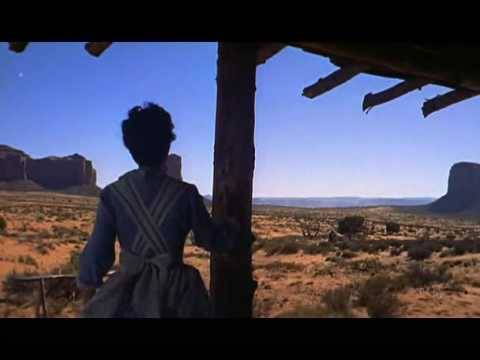
b) Man leaving home, stepping out into the wild:
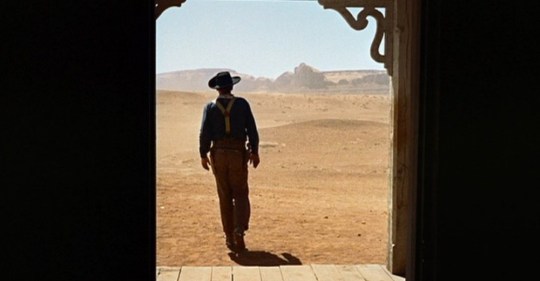
(These two stills are from John Ford’s The Searchers which is generally regarded as one of the greatest Westerns of all time. It’s………very racist and misogynistic, as many were and still are, but in terms of technicality and visual language, it’s a very well-made film, albeit not one I enjoyed).
The purpose at the time, of course, was steeped in historic sexism and invested in maintaining that culture, particularly westerns and war films which are heavily devoted to ‘macho’ narratives. Women were passive, men were active, but these images really set the stage for how the ideas of ‘space’ continues to exist in cinema. A fact that’s bolstered by broader social discourses that still exist today – schools, grocery stores, laundromats are inherently ‘female’ spaces because they are seen as an extension of the home, while police stations, car dealerships, warehouses, are inherently ‘male’ spaces because they’re about work, protecting and providing for a home, and being pointedly outside of that domestic space aka ‘the wild’. It’s not an accident that the girls are robbing grocery stores and day spas, but I’ll get back to that, haha.
These ideas of gendered spaces underpin everything we watch, no matter the genre.
Sure, these ideas can be subverted to varying degrees of effectiveness (often it’s steeped in my least favourite trope – the ‘not like other girls’ heroine), but you can’t subvert a trope without actually acknowledging it exists. Sometimes these subversions are done brilliantly too – like in Legally Blonde which was not just about Elle existing in a space that was quintessentially coded as male, but embracing her femininity and womanhood within that space; and often brutally too in films like Winter’s Bone, Room and The Nightingale which all brutalise women in ‘male spaces’ while simultaneously weaponizing female spaces against them – usually the home. The lead character of Winter’s Bone is going to lose her house unless her absent father shows up in court, the lead character of Room creates a home that is simultaneously a sanctuary and a mockery of a sanctuary to try and protect her son from reality and survive, the lead character of The Nightingale has her home invaded, her husband and baby murdered, and is horrifically raped within that home.
Hometown Horror: a divergence
This is a slight aside to where I’m going with this overall, but please indulge me, haha. I’m a big fan of horrors and thrillers, which explore this in a really stark way. In that, the invasion of a home or a domestic space – whether by ghost, demon or serial killer, is, generally speaking, synonymous with the invasion of a woman’s body and the violation of her as a person.
Films that focus on a female survivor or a ‘final girl’ are very generally focused on the invasion of her home as much as it’s focused on the invasion of her body. Think The Exorcist, Rosemary’s Baby, Scream, The Babadook, Hereditary, The Conjuring, Nightmare on Elm Street, Halloween, Panic Room. The violation of a woman’s home is the invasion of her, because cinema relies on over 100 years of movies telling us that a house and the woman who lives in it are symbolically the same thing.
Horror films that focus on men are very rarely centred in the home. It’s men travelling, or men visiting a woman’s home, or men who’ve been taken. Think of the first Saw movie which takes place in a mysterious basement, Hostel which is at a hostel, Dawn of the Dead at a shopping mall, An American Werewolf in London while two men are on holiday, The Evil Dead is in a cabin, Get Out is at his girlfriend’s family home.
There are exceptions, of course! Family home invasion films like The Purge, Funny Games and The Strangers are rooted in the violation of that home, but still. You’ll generally find that it manifests differently narratively speaking for men and women. Rear Window too takes place entirely in a man’s apartment – but it’s interesting to note that most of the ‘horror’ comes from him spying on somebody else’s home – notably a woman’s, The Descent too is very much about women and is set during cave diving. Still! These are all exceptions, not the rule.
Good Girls and Gendered Spaces
Every single space in Good Girls is gendered. It’s actually one of the things I seriously love about the show because it’s thoughtfully done, and it is deliberate. We know it is, because they tell us explicitly in the writing multiple times. I mean – hell, think of Ruby telling us (well, telling Rio, haha) way back at the end of 1.04 when they’re selling him on the idea of washing cash through Cloud 9 – “Nobody thinks twice about a woman buying her husband a TV or new tires for the minivan.” A store like that is gendered, and Ruby’s reinforcing it by saying it’s a place women go to build a home. It hasn’t been weaponized yet - - but our girls know how to weaponize it. They’re playing on the fact that people think women’s spaces are effectively impotent, and they’re telling Rio – and us as an audience – that they’re going to exploit it.
This is an idea the show revisits frequently. Women’s spaces are – both in life and in storytelling – spaces that are viewed as passive because they are representative of women, and what the show is – I believe – very invested in, is showing how those spaces are fundamentally active. If you want a house to represent a woman – well, okay. Then you get to see what’s under the rug, y’know?
I’m going to come back to the home thread – because I really do think it’s very important, and I think the way the show depicts people in those spaces (and invading those spaces) is significant – but it’s not just homes that are looked at in this way. The show is very specific about having feminine spaces and masculine spaces, with only a few in between (and usually those in-between spaces are very specifically for Stan and Ruby, showing just how in-sync they are with each other and how much they operate within a shared space). Beyond the women’s homes, there are the kids’ schools, Fine & Frugal (very important here to note that Annie emasculates Boomer in what is an associated female space and that he retaliates by attempting to rape her in her own home aka not only another female space, but a space that is symbolically Annie, something he repeats later with Mary Pat – a violation on essentially every character, narrative and symbolic level, again), the waxing salon, Nancy’s day spa, Jane’s dance recital (and actually the physical object of the dubby – being a highly feminine object lost in a very masculine space), and already what we know of s3, with Ruby being at a nail salon and Beth being at a paper / card store.
The show also has very masculinized places – I’d argue Boland Motors is one of the biggest ones – very much about ‘boys and their toys’, which is why Beth pointedly feminising it when she takes over is so significant and symbolically indicative of Beth’s claiming of that space; but also spaces like the police station, the drug dealer’s house in 2.07, the hotel suite Boomer briefly occupies, even to an extent the church. When the girls are in these spaces, there’s a distinct feeling of encroaching on territory that isn’t theirs, or being in spaces that they don’t belong in. This is often done as a two-hander too – the police station and the church Ruby doesn’t belong in anymore, not necessarily as a woman, but as a criminal.
Nothing though, from a technical standpoint, is more masculine than the spaces that are shown to be Rio’s. From the warehouse spaces to the bar to his loft to his car, Rio’s ‘places’ are distinctly masculine and generally placed in direct contrast with Beth’s femininity. But I’ll come back to that point too.
Home, Identity and Invasion
Almost every female character on this show has a very defined domestic space, from Beth, Ruby and Annie, to Mary Pat, Marion and Nancy. These spaces are representative of not just who they are, but who they are as women, and really comes to routinely represent the interior lives of these characters. This is probably the clearest in 2.09 when Beth is uncharacteristically messy following Dean taking their kids, and in 2.06, when Beth and Dean switch roles, and Dean is incapable of maintaining that domestic space because it’s not his. But let’s not start there.
Let’s start with Annie.
Annie’s apartment is fun, feminine (but not overly so), youthful, sweet, and generally a bit of organized chaos. It’s often underequipped – there are several mentions of the pantry being understocked – but it’ll always do in a pinch. More than anything though, Annie’s apartment comes to life when her son is in it. She’s happiest when he’s there, and when he’s not, her loneliness drives her to pulling people into the space with her, whether that’s the electronics guy, Greg, or Noah.
This is particularly significant when Annie’s forming bonds with people. The show has symbolically relied very heavily on Annie’s moments of vulnerability and connection being grounded in her apartment or an extension of it – usually her car. There was her reconnecting with Greg over YouTube videos in s1, there was Nancy and her talking about pregnancy in 2.02, and there was Noah settling in across season 2. These are all substantial moments in terms of Annie’s interior life that are represented through her home – she lets them all in. Which is why it’s significant what people do when they are in. Particularly the show marrying Noah getting to know Annie while simultaneously rifling through her belongings, trying to know specific things about her.
This is only reiterated by Noah’s scenes with Sadie later in the season – always at home, reiterating just how much Noah’s invaded Annie’s life, how much he’s inside her, how much he’s using everything and everyone who’s important to her, and how much he’s a threat to all of that too.
Ruby and Stan are a little different. Ruby’s house is the only one that’s genuinely shared with somebody, and the show represents this across the board – Ruby and Stan wear similar colours, the house feels like theirs, and the parts of their worlds that are separate are still frequently pretty defined by each other (even when Ruby’s acting away form Stan, the show makes it clear that Stan’s at the forefront of her mind, and vice versa). This indicates their partnership, but the house really still is symbolically tied to Ruby. This is particularly represented by the effect of having Turner in the house, but, more than that, it’s underlined symbolically by Turner arresting Stan at home. If the home symbolically carries the meaning of the woman, Turner arresting Stan there is starkly about Turner taking Stan away from Ruby. That image would not hold the same weight if he was arrested at, say, the park or the police station, because the locations don’t hold the same meaning.
It’s also why there’s significance in Stan and Turner’s showdown narratively speaking happening at the police station. It needs to, because symbolically it should occupy a masculine-coded space, because that showdown isn’t just about who they are as people, but who they are as men.
Beth and Beth’s house is very, very different to Annie and Ruby’s, and holds a more substantial narrative and symbolic function. From the very first episode, the potential of losing her house is key to her arc, and key to her identity as a character.
Beth is a lot of things, but a recurring image with her as a character is that she is invested in projecting a dated idea of ‘perfect womanhood’, and, within that, actually pretty perfectly creates parts of it for herself. For Beth – as somebody who was a housewife for roughly twenty years – her house really is her in every sense of the word. Every threat to that house, every disruption, every wrinkle, every intrusion, every theft, every invitation is personal. Dean might have at least two rooms in the Boland House, but that space is Beth’s on almost every symbolic level. When people pop into it, it’s a direct invasion of her.
This is something that the show has revisited time and time again, particularly when it comes to Beth’s bedroom. When people want to be close to Beth, that’s where they go. Annie slept there across season one when she was vulnerable and lonely, despite Beth telling her to go home, Jane broke into Beth’s closet there when she felt she was being neglected, Dean’s constantly trying to sidle into it (and – pointedly – only really in it when they’re fighting and Beth is revealing something / letting him in on something – that they’re out of money, that she has Rio’s money, that she knows about his affairs). When Beth has been at her most vulnerable, she lets Ruby and Annie into it. That said, the only character who’s been explicitly invited into it has been Rio – significantly both in fantasy, and in the show’s reality.
It’s not just about inviting people in though – when she kicks somebody out of it, the act is loaded.
She’s not just pushing somebody out of a space, she’s pushing them out of her.
It’s not just her bedroom of course (although I do think that’s the most significant space on perhaps the whole show). Rio and Turner between them have regularly invaded Beth’s living room, dining room, her kitchen, her yard. These are often distinctly tied with her doing something domestic and / or distinctly feminine. She’s bringing groceries home, she’s baking, she’s trying on jewellery, she’s mothering her children. Symbolically, this is often when Rio and Turner both are at their most masculine and their most threatening, which just serves to underline the invasion of Beth’s space.
It’s not just the girls though, as I said above. Female domestic spaces on this show are significantly coded as belonging to women, even if they share those spaces. Think about Nancy and Greg’s house – which is Nancy’s space, not Greg’s, and throughout season 1, Annie was pitted as the outsider to that. She’s a smear of hair oil on Nancy’s perfect couch. It’s made all the starker when Nancy kicks Greg out, and when Annie helps Nancy give birth in that house – a distinctly female, intimate act, that not only operates as a significant feminization of that space, but also about Annie fighting for Nancy to let her in again.
These spaces all keep secrets for the women they belong to too – Mary Pat’s husband’s dead body, Boomer’s very much alive one – because, again, symbolically, they are these women.
Rio’s loft is a really interesting one to look at in this context, because not only is it hyper masculine, but the show underlines that it does not hold the same significance that the girls’ places have for them. Beth does not learn Rio by being inside him – something made stark through their game of twenty questions. In fact, being in Rio’s loft, in his space, only serves to point out how much Beth doesn’t know him. Not only that, but Beth’s inability to lose her house (which is really central to her arc) is paralleled exactly with how easily Rio can separate from his.
The domestic space is not male.
Rio exists outside of it.
Beth x Rio and the Feminine x Masculine
Rio and Beth are basically at polar opposites of the masculine / feminine spectrum, and it’s something that this show often casts in a really stark light through dialogue, visual language, character coding and symbolism.
Beth epitomizes the old archetype of femininity and the female world in a way that I don’t think Annie and Ruby do (although I do think Ruby does in some respects). This is coded into almost every part of her character – from her long history of domestic servitude and marital submission (letting Dean control their finances, not working, keeping the house, etc.) to her fertility (four children!) to the way she dresses in floral, bakes, to certain traits, namely her nurturing tendencies, overt empathy and guilt (not being able to kill Boomer). Even in terms of the casting – Christina is somebody who has a very distinctly feminine body.
On the other hand, Rio, in many ways, epitomizes the old idea of masculinity and the masculine world. He’s coded that way almost as much as Beth is coded as feminine – he’s physically strong (beating up Dean, holding Beth up while they were having sex), assertive, dominant, capable and collected. That’s not even touching on the fact that the golden gun is incredibly phallic, haha.
The show loves to place Beth’s femininity in direct contrast with Rio’s masculinity in a way that it doesn’t do with the other girls or – in fact perhaps more notably – with Beth and Dean (if anything, Dean’s frequently emasculated around Beth, but that feels like a whole other thing, haha), and it does this frequently, and often even in the same shot.
Most notably, think of her pearls on the warehouse door handle:
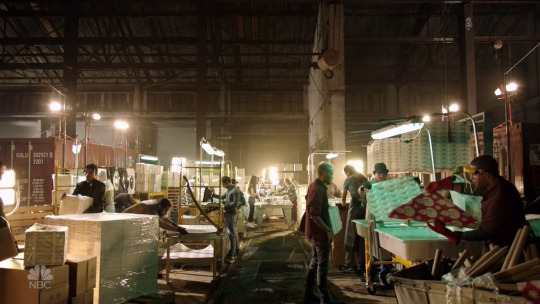
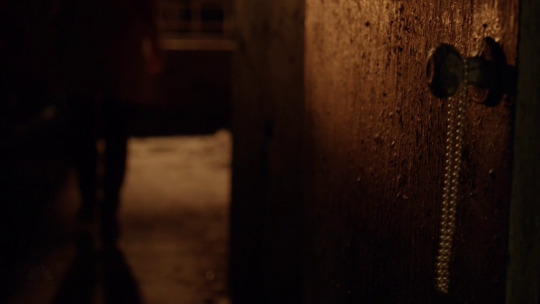
Their cars parked side-by-side:

Her necklace, his gun:
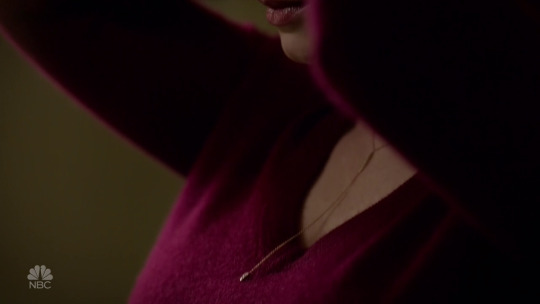
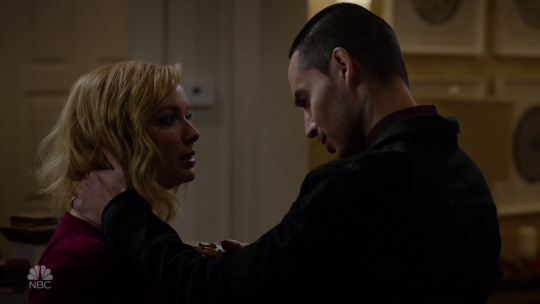
Her light, his darkness:
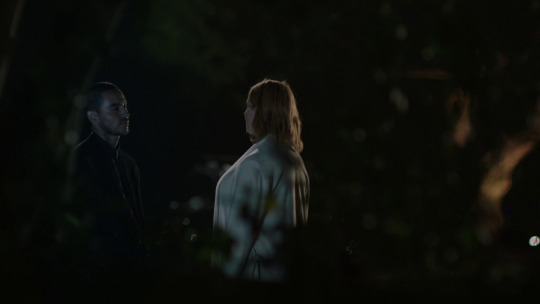
Her floral, his solid colours:
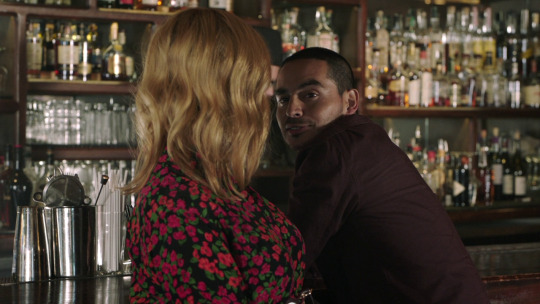
Interestingly though, these things are very rarely in competition or combative (although occasionally they are – Rio trying to use her femaleness and his maleness / their sexuality to literally bend her over a table in 2.06 being the clearest example of that). Generally speaking, the show’s visual language though shows us how these things compliment each other. They occupy different gendered spaces, so they can ‘crime’ in different ways – Beth using the big box stores, the secret shoppers, robbing the day spa, are all things that are highly feminised, and give Rio by proxy access to a world he ordinarily wouldn’t (albeit it’s not always a world he’s interested in – like it wasn’t with the botox), and the reverse of that is that Rio gives Beth access to spaces that are highly masculinised and that she ordinarily wouldn’t have access to (again, not always a world she’s interested in either). It’s why when they’re working together, and acknowledging they have different departments, they actually become something really whole, comprehensive and effective.
It’s the exploration of this that I find really intriguing generally, and particularly a thread that I think is reiterated where Beth’s usually at her worst and her most ineffective when she’s trying to emulate Rio’s masculinity. We saw that at the end of 1.10 and the start of 2.01, and I think we saw it at the tail end of season 2 too. When Beth’s succeeding, she’s typically doing something that revels in the strength and power and the underestimation of femininity and female spaces, and turns places that are typically viewed as passive into active ones.
The Secret Shoppers (which worked briefly! And fell apart because she couldn’t handle Mary Pat. Notably almost every scene with them was inside Beth’s house):
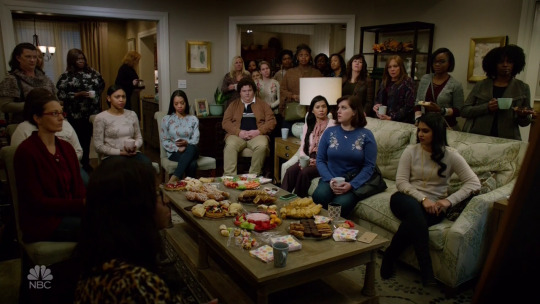
The day spa heist:
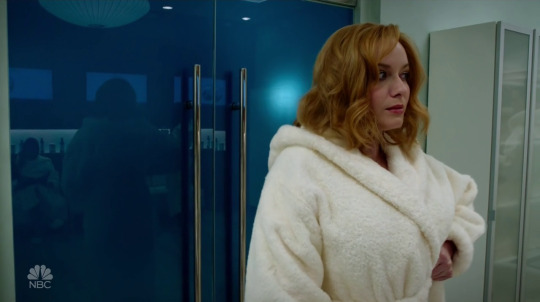
The Boland Motors takeover / reclamation that focused on feminising the place:
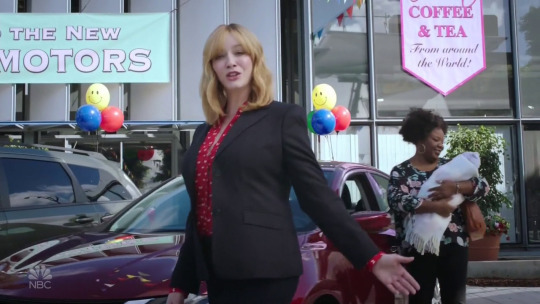
Pretending to be somebody’s mum to get into the kids’ space (which would’ve worked if Beth and Ruby hadn’t started fighting):
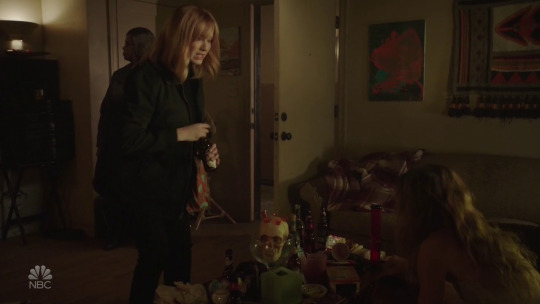
Breaking into Rio’s loft:
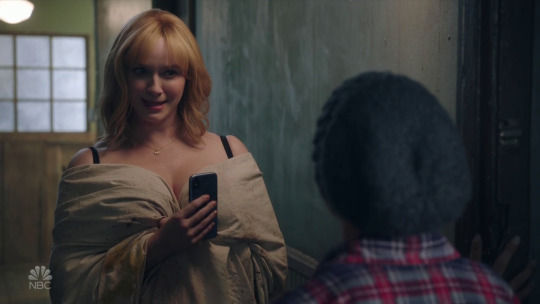
Again, this is something that seems to be being teased out already in s3 with the paper store and the nail salon, and I’m sure we’ll see it coming up again and again beyond that.
But yes! Your question, haha. I think Rio is enamoured with the strong, feminine space and the untapped female world that Beth exists in, and the ways that she is actively capable of utilising her femininity and her womanness in a way that is completely impossible for him. She can manipulate these spaces – either those already female, or those she makes female aka Boland Motors – in ways that he can’t, and in a way that, at the end of the day, lines his pocket, in the same way that giving her access to his powerful, masculine world lines hers. It’s market development, y’know? But it’s also something that could be a true and successful partnership if they could stop, y’know, playing games and trying to kill each other, haha.
I think it’s worth noting here too that the show has shown us explicitly that Beth absolutely gets off on Rio being highly masculine, and while I think Rio absolutely gets off on Beth being a boss bitch too, it’s also important to note how he responds to her when she’s displaying vulnerability in a way often defined as very feminine – namely crying – and how that display of femininity not only affects him, but often makes him want to touch her (and more and more, follow through on touching her).
Basically I think they’re as obsessed with the contrast between the two of them as we are, haha.
#beth x rio#gg season 1#gg season 2#gg season 3#set dressing#beth boland#rio#welcome to my ama#annie marks#ruby hill#stan hill#jimmy turner#nancy#mary pat#leslie peterson#boland motors#the boland house#the hill house#annie's apartment#rio's loft#femininity#masculinity
113 notes
·
View notes
Text
Wellesley Writes It: Conversation with Sumita Chakraborty '08 (@notsumatra), author of ARROW
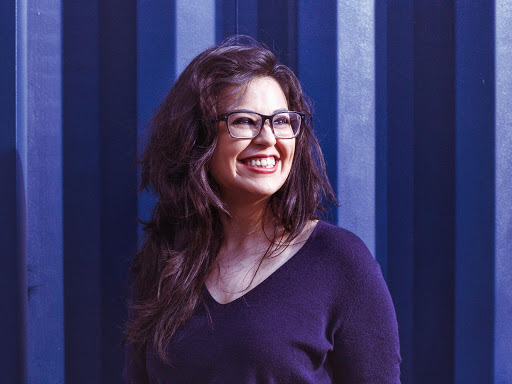
Sumita Chakraborty is a poet, essayist, scholar, and a graduate of Wellesley College, class of 2008. Her debut collection of poetry, Arrow, was released in September 2020 with Alice James Books in the United States and Carcanet Press in the United Kingdom, and has received coverage in The New York Times, NPR, and The Guardian. Her first scholarly book, tentatively titled Grave Dangers: Death, Ethics, and Poetics in the Anthropocene, is in progress. She is Helen Zell Visiting Professor in Poetry at the University of Michigan - Ann Arbor, where she teaches in literary studies and creative writing.
Sumita’s poetry appears or is forthcoming in POETRY, The American Poetry Review, Best American Poetry 2019, the Academy of American Poets’ Poem-a-Day, and elsewhere. Her essays most recently appear in the Los Angeles Review of Books. Her scholarship appears or is forthcoming in Cultural Critique, Interdisciplinary Studies in Literature and the Environment (ISLE), Modernism/modernity, College Literature, and elsewhere. Previously, she was Visiting Assistant Professor in Women’s, Gender, and Sexuality Studies, as well as Lecturer in English and Creative Writing, at Emory University.
Wellesley Underground’s Wellesley Writes it Series Editor, E.B. Bartels ’10, had the chance to chat with Sumita about publishing, reading, and writing. E.B. is grateful to Sumita for willing to be part of the Wellesley Writes It series in the middle of her book debut!
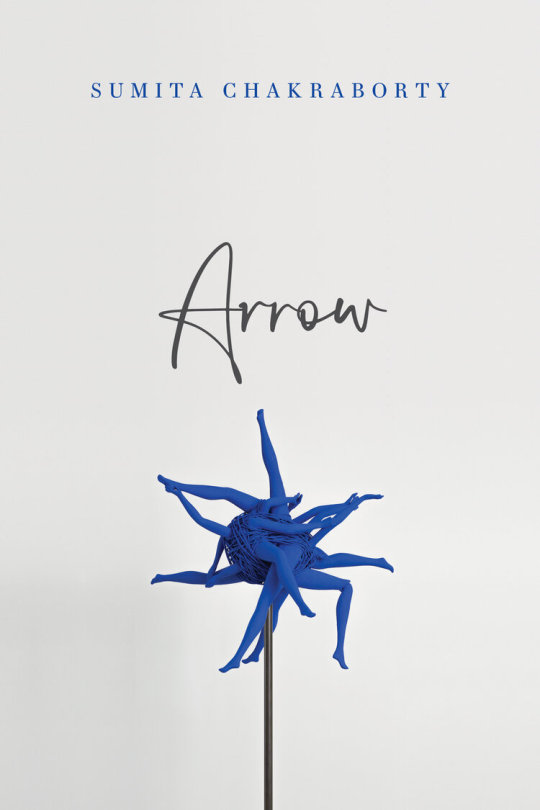
EB: Thank you so much for being part of the Wellesley Writes It series, Sumita! I’m excited to get to talk to you about writing in general, but especially your debut collection Arrow. Can you start off speaking a bit about how this book came about?
SC: Thank YOU so much! This is such a joy.
The book that’s now Arrow went through about seven prior full versions.
EB: Oh my gosh! Wow.
SC: While there’s a lot going on in there, the most fundamental story I wanted to tell was that of the experience of living in the aftermath of severe domestic violence, other entangled forms of assault, and grief (in my case, particularly for my sister, who died in 2014 at the age of 24). The word “aftermath” is a tricky one, because there is no neat and tidy “after” violence or grief, particularly when one considers the varying scales on which various devastations and mournings take place. One of the main narrative arcs of the collection, though, is that of becoming someone who can embrace love and joy and care and kinship even when those concepts have been weaponized or altogether foreclosed for all of one’s childhood and adolescence. And that’s a narrative that requires a sense of an “after” that I am deeply fortunate to have personally experienced. That’s the main tightrope the collection is invested in walking, which forms the through-line around which and with which its other preoccupations and obsessions orbit and collide.
EB: Wow, thank you so much for sharing all that, Sumita. I especially like what you said about the lack of a “neat and tidy” ending -- isn’t that always the case when it comes to writing about things from our own lives? We want real-life closure but sometimes have to settle for just narrative closure instead.
I meant to say also congratulations on the publication of your collection not only in the US but in the UK as well! What was it like to put that version together? The same? Different?
SC: I was wildly lucky in this regard. Some years ago, I published the poem “Dear, beloved” in Poetry, before it was in Arrow—and in fact before this version of Arrow even existed. At that point, the editor of Carcanet reached out to me to say that the press would be interested in bringing out my collection in the UK. I kind of panicked!
EB: I totally would have, too!
SC: As I mentioned, there was no Arrow yet. I was on a much earlier version that was “complete,” but when I looked at it, I knew: This ain’t it. And querying US presses was therefore not something I was prepared to do at that time; UK publication was even less within the realm of my imagination. I essentially told them the manuscript was in progress and asked if I could reach back out when it was ready and if I had secured a US publisher. Some years later, the collection was picked up by Alice James in the States and I reached back out to Carcanet to see if they were still interested, and they were! Alice James and Carcanet worked together during the production process, so while there were certainly some differences in approaches across either side of the pond, much of it was really streamlined, and that is all thanks to the outstanding and immense labor of the extraordinary editors and staffs at both publishers.

EB: How did you begin writing poetry in the first place? What was your path to becoming a writer?
SC: I didn’t come into much of a sense that I was interested in poetry and in literature until college. When I got there, I didn’t have a sense of really any passions and skills that I had, and that’s not imposter syndrome speaking—it’s because I had a terrible record in high school and found nothing inspirational there, and I was also pretty busy attempting to survive the violence I was experiencing at home and working toward moving out, which I did before college. In my first year and my sophomore fall at Wellesley, I took a really broad smattering of courses, including (with wild, and probably inappropriate, disregard for prerequisites in both cases) Advanced Shakespeare with William Cain and Advanced Poetry Writing with Frank Bidart. I was very much not good enough for both of those courses! But even as I was flailing around in them, something in my mind clicked: this was something I was willing to be terrible at until I started to understand it a bit better. These were puzzles that I liked, questions I liked, problems I cared about dwelling with. It was pretty much “love at first confusion.”
EB: I love that idea: “this was something I was willing to be terrible at.” That 100% nails how I feel about writing, too.
So, obviously, as you just said, Wellesley was very important in your trajectory as a poet -- the title of your book is a reference to a Frank Bidart poem! Which other faculty, staff, fellow students have influenced or inspired you? Are there any professors or classes you would tell young Wellesley writers that they 100% have to take?
SC: Following “love at first confusion,” I essentially made a second home of the first floor of Founders, so my answer to who at Wellesley influenced or inspired me could fill multiple pages!
EB: I love Founders. I miss Founders.
SC: I will invariably accidentally leave someone out and feel guilty, so I offer my mea culpas in advance. In addition to Bill Cain and Frank Bidart, I am beyond grateful to Dan Chiasson, with whom I worked on both my literary studies (including my thesis) and my poetry, and who graciously offered me more mentorship than I’d ever experienced in my life before that point; to Kate Brogan, from whom I got the bug for twentieth-century poetics, which remains the focus of my literary studies research; to Yoon Sun Lee, who taught the theory class when I took it, and planted a hugely important seed that I didn’t even know had been planted until much later simply by being a brilliant Asian American literary scholar (not a role I had ever before seen filled by someone of this subject position); to Larry Rosenwald, who was the first person I had ever met in a literary context who both knew that English was not my heritage language and, in his infinite and genuine passion for multilingualism, viewed that fact as a strength.
I wish I’d had more of a chance to get to know my peers while actually at Wellesley—my life circumstances while I was in college differed from the typical Wellesley experience in ways that made doing so challenging (for one, I worked multiple jobs the entire way through), but I’ve gotten to better know many people I knew at Wellesley more in the years since and that’s been a wonderful experience.
EB: I’ve also made a lot of Wellesley friends post-Wellesley. The Wellesley experience never ends, in that way.
SC: Since I’ve already spoken to the coursework that inspired me, I’m going to zig a bit where your last question zags: there isn’t a single course I would tell young Wellesley writers or literary enthusiasts that they 100% have to take. I don’t think one could go wrong with anyone I’ve named here (and I’ve been really excited to learn about the new additions to the English department: I would have loved to have learned from Cord Whitaker and Octavio González, and have heard wonderful things about both!). But I think that what made the Wellesley experience truly influential for me was that I had the opportunity, like Whitman’s “Noiseless Patient Spider” (though, um, not very noiselessly or patiently), to “launch’d forth filament, filament, filament,” and really listen to what spoke to me. I came in with no preconceptions, no expectations, no firm career plan (or even career plan). Knowing what undergraduates at environments like Wellesley frequently pressure themselves or feel pressured to do (or achieve or produce or attain), I don’t want to offer advice along the lines of a “must-do.” Rather, try things out and truly listen to yourself. What’s your “love at first confusion”?
EB: I know from personal experience that writing can be a really lonely practice. Who did you rely on for support during those really frustrating writing moments? Other writers? Your spouse? Friends? Fellow Wellesley grads? What does your writing/artistic community look like?
SC: All of the above! The thing is, for me, I don’t think writing is a lonely practice. When I feel most energized about writing, it is because I feel like I am in a conversation—or, to put a finer point on it, when I’m in a conversation that is nestled within hundreds of thousands of other conversations that have happened for millennia, are currently happening all around me, and will continue to happen after I’m a hunk of dirt. Tapping into that is often what brings me to the page in the first place.
EB: That’s such a good point.
SC: So when students, for example, feel really isolated or alone in their writing life, my first recommendation is to remind themselves of their beloveds. These may be actual living ride-or-die humans in their lives; these may be ghosts of writers and artists past that are important to them; they might be their most frequently bustling group text or their favorite TV show. Honestly, if one’s thinking of this question as broadly as I recommend, those beloveds probably belong to all of the above categories, to some degree. When you write, even if none of these beloveds are your subject or your audience or anything quite that easily analogous to the process, they are with you, and they have formed who you are before you’ve even picked up a pen or turned your computer on, so they are with you when you are writing, too.
EB: What is it like to now be teaching poetry to undergrads? Are you channeling your inner Dan Chiasson?
SC: Ha! Thank you for that—I just got a visual of myself trying to go as Dan for Halloween and I cracked myself up. (Dan, if you’re reading this: sorry!) I teach undergraduates and graduate students at Michigan, both in literary studies and in creative writing, and I love it very, very much. My students of all levels are brilliant, thoughtful, curious, and wildly imaginative people who often help bolster my faith in the ongoing importance of literary work. Honestly, particularly during this year, I have frequently been in awe of my students and have felt overwhelmingly lucky to be able to work with them.
EB: I know that you are also currently working on your first scholarly book, Grave Dangers: Death, Ethics, and Poetics in the Anthropocene. How do you approach writing poetry vs. writing an academic work? How is your creative process similar or different?
SC: For me the two have been inseparable since Wellesley. I essentially ask similar questions and have similar preoccupations no matter what genre I write; in terms of deciding which thought belongs to which genre, or which project a particular moment is better suited to, that’s often a matter of thinking carefully of what shapes that I want the questions to take, and what kinds of “answers”—in quotation marks because I don’t strive at certainty or mastery in either genre, or in anything for that matter—for which I imagine reaching or searching. For me, the processes for writing both are very, very similar: I draft wildly and edit painstakingly. It’s more a matter of closely listening to my patterns of thinking on any given subject or day in order to find out if the rhetorical patterns of academic prose would better suit them or if the rhetorical patterns of poetry would better suit them.
EB: What are you currently reading, and/or what have you read recently that you’ve really enjoyed? What would you recommend to read while we (are continuing to) lay low during this pandemic?
SC: 2020 was such an incredible year for books! Which feels somewhat perverse to say, considering everything else was dismal and it was hardly an easy year to put out a book, either. In terms of new poetry releases—and this is not a comprehensive list, so my mea culpas here too to the many that I have loved and will end up accidentally leaving off—I have this year read and loved: Taylor Johnson’s Inheritance, francine j. harris’s Here is the Sweet Hand, Craig Santos Perez’s Habitat Threshold, Jihyun Yun’s Some Are Always Hungry, Eduardo Corral’s Guillotine, Rick Barot’s The Galleons, Jericho Brown’s The Tradition, Shane McCrae’s Sometimes I Never Suffered, Victoria Chang’s Obit, Danez Smith’s Homie, Aricka Foreman’s Salt Body Shimmer, and Natalie Diaz’s Postcolonial Love Poem. Two prior-to-2020 poetry collections that I reread every year are Brigit Pegeen Kelly’s Song and Lucille Clifton’s The Book of Light. I’m currently reading Claudia Rankine’s Just Us and Alice Oswald’s Nobody.
EB: Also what about Lucie Brock-Broido? I know she was a teacher of yours at one time, and she was a professor in my MFA program. I had the pleasure of once sitting in on her lecture, and it was life-changing. Are there any particular poems of hers you would suggest?
SC: I joined Lucie’s summer workshop held at her home in Cambridge, MA the summer after my sophomore year at Wellesley, and I stayed in it until I moved to Atlanta for graduate school in 2012. “Life-changing” is right—in fact, it feels a little too modest. She was transformative. A cosmos-realigner. A hilarious, brilliant, extraordinarily kind meteor. A fox with wings. A unicorn. I could go on, and on. For a reader new to her work, I’d recommend starting with her posthumously published “Giraffe” in The New Yorker. I think “A Girl Ago” and “You Have Harnessed Yourself Ridiculously to This World” from Stay, Illusion (2015) are also remarkable entry points. After that, I would probably recommend reading her collections in this order: first Stay, Illusion; then A Hunger (1988); then The Master Letters (1997); and finally Trouble in Mind (2005). The sequencing here isn’t intended as a ranking in the least—my own personal favorites toggle back and forth depending on where my own “trouble in mind” lives, and each collection is dazzlingly strong and has its own raison d’être—but rather because I think the story those collections tell in that order would let a new reader have a full sense of Lucie’s poetics outside of the story that mere chronology can tell.
EB: Any advice for aspiring young poets?
SC: Filament, filament, filament. Let your writing life be as huge and wild and disparate as the whole person you are—don’t feel like there’s only a part of you that’s “worthy of poetry,” and don’t let anyone else tell you what kind of writer you should or shouldn’t be.
EB: Thank you, Sumita! That was wonderful.
#wellesley writes it#wellesleywritesit#wellesley#wellesley underground#wellesleyunderground#sumita chakraborty#eb bartels#e.b. bartels#class of 2008#class of 2010#poet#poetry#writer#writers
4 notes
·
View notes
Photo
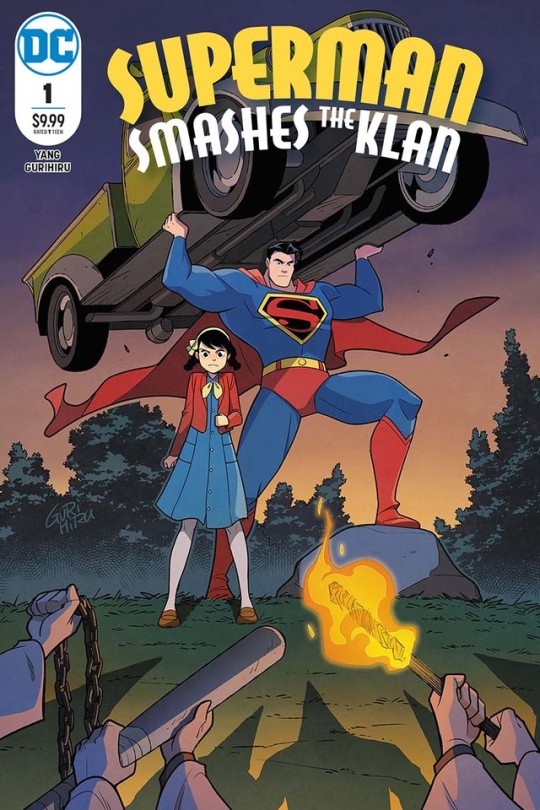
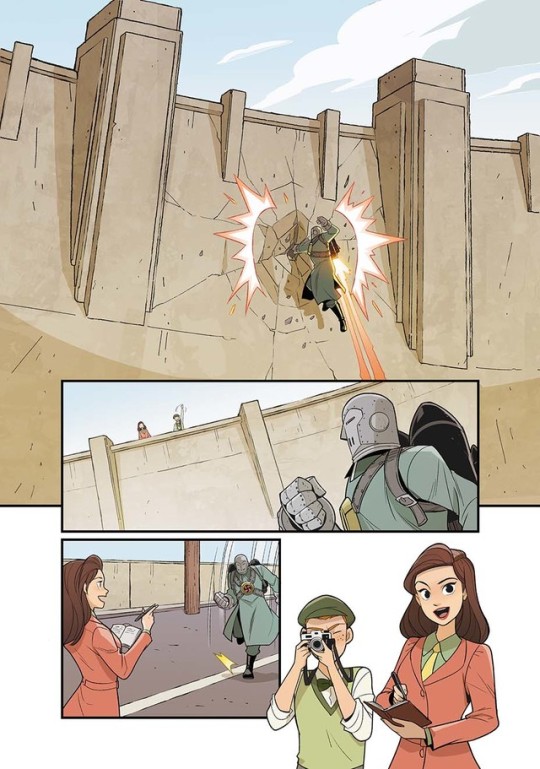

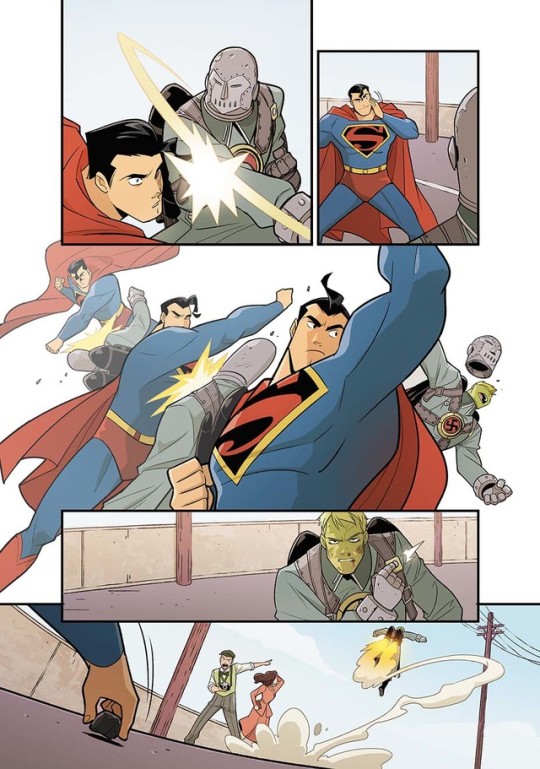
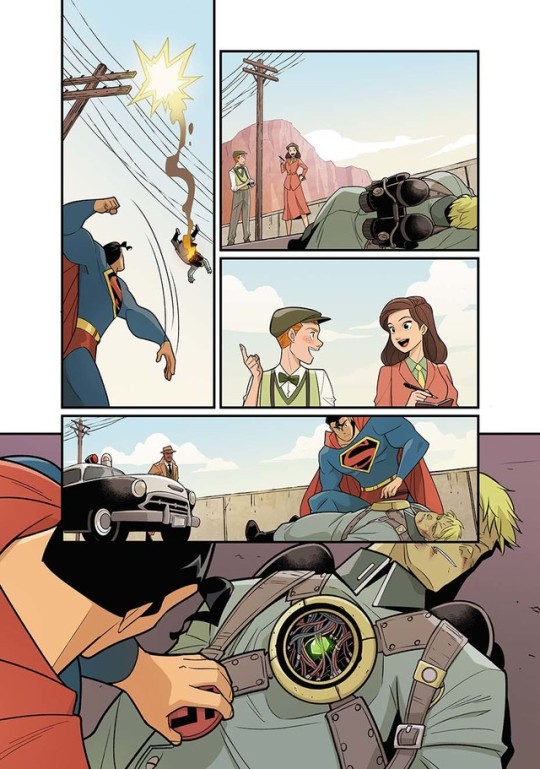
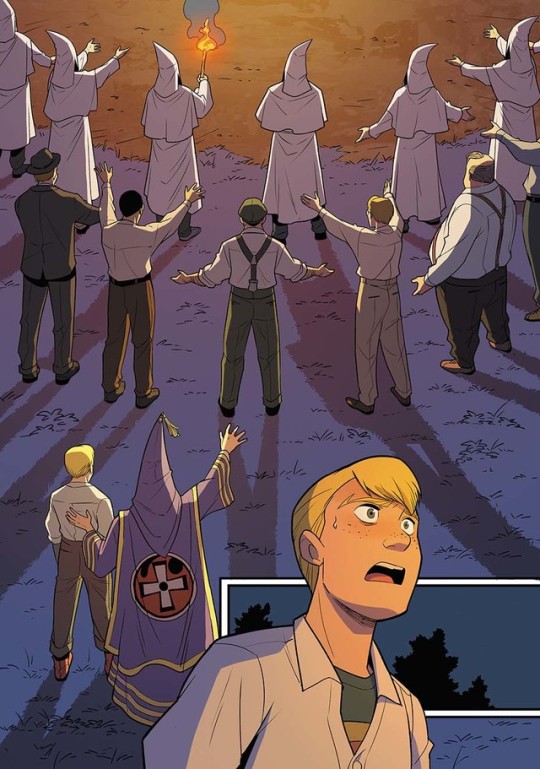

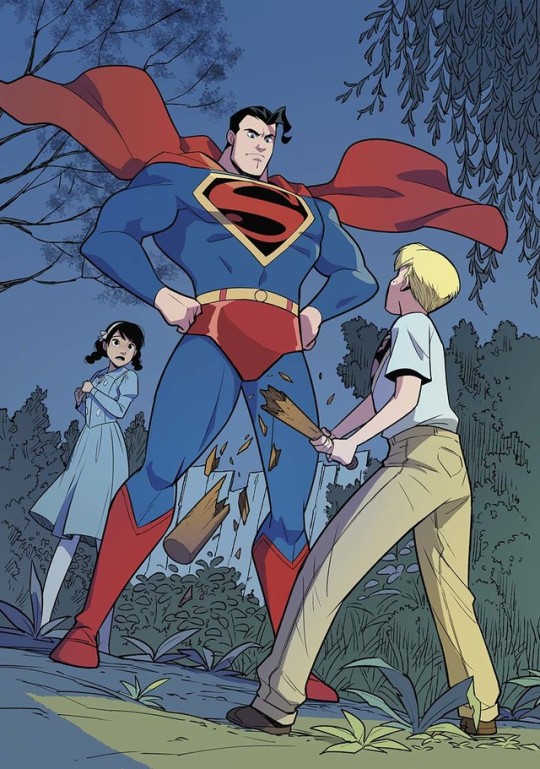
Preview Pages and Interview for SUPERMAN SMASHES THE KLAN
Superman Smashes the Klan launches Oct. 16, with the first of three 80-page perfect bound issues. The collected edition of the story will be released in 2020. DC’s official solicitation for the first issue is below, followed by artwork from the issue.
“The year is 1946, and the Lee family has moved from Metropolis’s Chinatown to the center of the bustling city. While Dr. Lee is greeted warmly in his new position at the Metropolis Health Department, his two kids, Roberta and Tommy, are more excited about being closer to their famous hero, Superman!
“While Tommy adjusts to the fast pace of the city, Roberta feels out of place, as she tries and fails to fit in with the neighborhood kids. As the Lees try to adjust to their new lives, an evil is stirring in Metropolis: the Ku Klux Klan. When the Lee family awakens one night to find a burning cross on their lawn, they consider leaving town. But the Daily Planet offers a reward for information on the KKK, and their top two reporters, Lois Lane and Clark Kent, dig into the story.
“When Tommy is kidnapped by the KKK, Superman leaps into action — with help from Roberta! But Superman is still new to his powers — he hasn’t even worked out how to fly yet, so he has to run across town. Will Superman and Roberta reach Tommy in time?
“Inspired by the 1940s Superman radio serial ‘Clan of the Fiery Cross,’ Gene Luen Yang (American Born Chinese, Boxers and Saints, The Terrifics, New Super-Man) brings us his personal retelling of the adventures of the Lee family as they team up with Superman to smash the Klan.”
I’m really curious: How did this get started? Obviously, there’s a history to the Klan of the Fiery Kross and the Superman radio show, but how did you get your in on this particular story?
I first heard about it through the book Freakonomics; they actually devote an entire chapter to the whole thing, how this one storyline in the Superman 1940s radio show dealt a huge public relations hit to the Ku Klux Klan.
I remember reading about it and learning that the incident that set the whole thing off in the original show was a Chinese American family moving into Metropolis. So, I’ve been a superhero fan since I was in the fifth grade — the very first comic I bought was a Superman comic — and I’ve been reading Superman comics since I was a little kid, and I can’t really remember any other Chinese, or Chinese American characters showing up in any of the comics that I’d read. So, it kind of piqued my interest.
Then, I started working for DC in early 2015; I did a 10-issue run on the monthly Superman comic, and after that I’ve been part of the DC comics family. I had the opportunity to have lunch with Marie Javins, who is one of the legendary editors at DC, and this came up as an idea of what to do.
I’m super excited to be working with the artists Gurihiru. I don’t know if you’re familiar with their work, but they’re so good; they’re a Japanese art studio, but it’s really just two women — one does all the pencils and the other does all the inks. Early on, the editor and I talked about going for an art style that’s just like the old Fleischer Superman cartoons but mixed with a manga influence, and I feel like they totally delivered on that. That’s exactly what they did.
The acting is so good. It looks so simple, but what they’re doing on the page is so clear.
The acting is what puts them over the top. It’s what makes them masters.
One of the things that I like about the first issue is that you show Superman as an inspirational figure not only to the "good guys," but also to Chuck, who’s the child who doesn’t necessarily understand what Superman stands for. The iconography of Superman is shown to be this nuanced thing.
One of the things about the Superman radio show, and the original version of this story, is that it actually comes relatively early in Superman’s career. He was first published in 1938, and the story was broadcast around 1946, so that’s just eight years, and he was already a worldwide phenomenon. And especially in America, he was wildly popular. But I do feel that the Superman that we all know and love today, he wasn’t quite formed yet [at that time].
There were still pieces of him that were being solidified. And as much as the radio show impacted the real world in terms of bigotry and racism, it also helped shape Superman’s character. It was at this point where Superman really did become a symbol of American tolerance, American justice and American hope.
The subject of Superman not being a fully formed character is something you play with in the text of this book, as well as the subtext; Clark is still learning who he is — his power set, his abilities and his cultural heritage. He’s literally a character in flux, just as he was at the time when the original radio show was broadcast.
The more I read about the radio show, the more fascinated I was. When Superman first appeared in 1938, he was essentially a glorified strongman, you know? He couldn’t fly. He was superfast, superstrong, he could jump high, but even then, there was a limit put on how high he could jump. It was specifically said that he could jump 20 stories.
A lot of his development actually happened in the radio show. He actually flew for the first time in the radio show; the radio show was where Kryptonite showed up for the first time. A lot of that comes from the fact that the radio show got so popular that it became a daily thing, whereas the comic was still monthly; they really needed to develop Superman — his mythology, his world — really quickly.
So, when I learned about that, I thought, this is a comic book adaptation of this old radio show — we should play with some of those elements. We should play with the fact that he doesn’t fly, or that Kryptonite is a brand-new thing.
But despite that, he remains Superman as we know him. There’s this essential Superman-ness that comes through on every page. You talked about reading Superman when you were a kid; is this something that you just inherently “get”?
My parents were born overseas, and growing up, I went through this period of time when I had a hard time vacillating between two identities. I had a Chinese identity at home, I had an American identity at school, I had two different names! When I was a kid, I did gravitate toward Superman, but when I got into my teenage years, I started getting into characters I thought were more “cool” — cool in quotes! [laughs] — but one of the things that drew me back to Superman was realizing that he was an immigrant from Krypton.
Like, all of those things: vacillating between two different identities, having two different names, having two different sets of cultural expectations. All of the realities of my childhood, all of it was encoded in Superman.
I actually have a theory about this — the reason why Superman presents himself as “perfect” is because he’s an immigrant. I saw it with my own parents; they came here and people perceived them as “foreign,” [and] they were always cognizant of this. The way they dealt with that was by trying to be perfect citizens. I think Superman does the same thing; the reason he tries to be a perfect citizen is because he knows he’s an alien. As I built a connection with the character, that’s what it became. He really became an icon for me after I saw all of this — [Jerry] Siegel and [Joe] Shuster knew all of this, they were children of immigrants. They put all of this in the character.
I think a lot of time, when we see him on cereal boxes, or whatever, we miss that, but it’s the core of the character. The core of Superman is that he’s an immigrant from Krypton.
That ties in with something else I enjoyed about the first issue — that there is so much about Superman being confused about his cultural identity. It plays against what’s going on with Tommy and Roberta’s family — it’s a connection that you’re not hitting people over the head with. You’re showing that Superman is an immigrant even as he passes as, as you said, this “perfect citizen.”
I hope so. All of that was in the character from the very beginning. His immigrant status has been there since the very beginning and is, I think, closely tied to his being an American icon. Those two things go hand-in-hand. The immigrant story and the American story are pretty much the same thing.
How much of that is present in the original story? Was the original radio serial as interested in Superman as an immigrant explicitly? Did Tommy and Roberta play such important roles, even though they were Chinese American characters?
For the radio show, I would say that the lead character was definitely Superman, and after that, the focus was on Chuck, then Tommy. Roberta, Tommy’s sister, didn’t even exist in the radio show. For me, I wanted to center the story on this Chinese American family. I really do think of this book as an Asian American book — maybe not just that, an immigrant book. By putting this Chinese American family center stage, it really highlighted the specific immigrant side of Superman.
Spinning off that, there’s the fact that this story is being published today. We’re at a point in history now where even the discussion of immigration in America is this impossibly charged topic. It feels important at this moment to have a story — specifically, to have a Superman comic — that pushes back so clearly against bigotry and racism, that does make the appeal for tolerance.
It’s not just America. You read the news about Europe, India, or the Philippines. I started this project because I thought it was something that I needed to understand. There’s a Chinese tradition that you use the events of the past as a way of talking about the present; I did come onto this project thinking about that, thinking, if I can understand the historical context that there was something about the present that I’d understand a little bit better.
One of the things that came out of this — we’re at the tail end of the third and final book right now, as we speak; I’m just about done with the revisions — and one of the things that I’ve learned is that the world learned something about tolerance after World War II. Not just America; all of us learned something about tolerance. World War II was the worst nationalistic instincts of the world come to a head — the worst instincts of our species had manifested themselves pretty much everywhere in the world. And then, this Superman story, which arrived a year after the war ended, was primed to convey the lessons the world had learned to a younger generation.
I just think that, maybe we’re so far removed from that period that we’re beginning to forget those lessons. That was the impression that I got.
Did you go into it with the idea that this was a lesson that needs to be retaught? This is, after all, a project aimed at younger readers? Were you thinking in terms of, lessons needing to be relearned in today’s culture?
To be honest, I was more going into it thinking that there were things that I personally wanted to understand better. The original storyline was very didactic, but I don’t think it was just about the lesson that was explicitly said in the story. It was also about the historical context in which that story came out. I wanted to go in to try and understand that a little bit better. I’m hoping that me wrestling with those issues comes across in the story.
You said that Chuck was one of the lead characters in the original version of the story, and one of the things that’s compelling about the first issue is Chuck’s story. He’s a character who’s leaning toward bigotry and hatred, and is pretty explicitly being taught that by his family, but you don’t write him off; there’s the implication that he can go another way, he can learn to be better.
Chuck’s a character in the original radio show, and in the comic adaptation, we kept all the big pieces of who he is. He begins as kind of a bigot, but he has an arc. To fill out that arc, I did read a book called Rising Out of Hatred, it’s written by a guy named Eli Saslow. It’s the biography of Derek Black, who is David Duke’s godson; he went from being the heir apparent of the American White Supremacy movement, and he’s the exact opposite now. When he’s not in hiding — he had to go into hiding — he’s speaking out against the views he was raised with. I read that book wanting to understand how someone could make that transition; I wanted to embed some of that in the character of Chuck.
Changing gears somewhat; you’re a National Ambassador for Young People’s Literature, and comics specifically. When you’re working on a project like this, especially on a character as iconic as Superman, is this something that you can see as a tool for new readers to use to get into, not just Superman, not just comics, but stories about things that are happening in the real world? Stories that matter.
I actually feel really lucky to be working in comics today. I think over the last, maybe 10 to 20 years, we’ve seen this shift in the public perception of comics. More and more, people are open to the idea of comics dealing with serious topics, and I hope this project fits in with that. I do think that there is a growing wave of comics that want to tackle the very heart of what it means to — do you know the book Bitter Root? It’s an Image Comics title that’s coming out right now.
Yeah, Sanford Greene and David Walker’s book.
I think that book is one of the best examples of using genre to talk about very important and serious topics. I’m trying to do something similar with this Superman book.
- Admin
983 notes
·
View notes
Text
Sarah Rogers and how Steve inherited ‘stubborn little shit’ from the womb
Okay, so I was noodling on Sarah after reading her Marvel wiki and some extraordinarily good posts about how EG Steve should have gone back to see his mum instead of Peggy etc and the timings of Steve’s early story struck me as... interesting.
Steve is born on 4th July 1918, before the end of WWI, meaning he would have been conceived in September or October of 1917 - that is, if he was born on time or only a few weeks premature. Which, given the tech and prognosis for preemies in the early 20th century, must have been the case because things were grim enough even if you weren’t born prematurely, for both baby and mother. If you were giving birth, you had a 6% chance of dying in Ireland in this period - roughly comparable with the rest of Europe but shockingly high by our standards. The odds were better if you were rich, but not by that much. Childbirth remained the leading cause of death for women worldwide until the late 1940s, remember. And kids fared no better. One in five children born in Dublin in this period died before their 5th birthday. Again, the figures would be better or worse depending on how well off you were, but even the richest still suffered appalling infant mortality rates.
Anyway, depressing history of women’s health aside, this means that Joseph Rogers, American solider, and her, must have been doing the do about then, and probably seeing each other on the regular before that, because believe you me, casual sex in the early 20th century was a big no no. Not to say it didn’t happen, but usually only via prostitution ESPECIALLY in Ireland, because the Catholic Church ruled supreme there even more than the British did and contact between the sexes was very restricted and frowned upon. Sex ed was nonexistent, and women knew that even a whiff of scandal about them was enough to ruin them, their entire family, and the rest of their life. It’s a hackneyed joke because it’s true: Ireland is small and everyone knows everyone. You would get found out and then suffer the consequences - sent to a mother and baby home if you were lucky, and those places were worse than prisons sometimes. That cultural context would carry over even if Sarah wasn’t actually in Ireland at the time.
So, likely they were married by then, because again: social ruin. The Marvel wiki says they were married, but not when. (I know nothing about the comics, I’m sorry) Soldiers and their sweethearts often married very quickly, and there are actually quite a few accounts of nurses falling in love and marrying the soldiers they tended. (More on this later) However, if she was widowed and could have the child respectably, why not return to Ireland? With, presumably, a support network that makes emigrating to America a worse, not better, prospect? This is the crux of my theory: Sarah Rogers was seen as an unmarried mother, and treated as such, because she married Joseph abroad, probably without permission, and when he died, had no social proof of the marriage. And in those days, unmarried mothers either: aborted in secret, had the baby concealed by the church where they were then taken and given up for adoption, or were cast out with nothing and ostracised if they decided to keep the baby. Sarah ending up in America strikes me as her taking the third option, and indeed the only option she could, to keep her baby.
But first: Joseph and Sarah need to meet in order to get down and dirty. How? He’s an American soldier who would never have set foot in Ireland in WWI - the British government kept their troops there, obviously, but the Americans were all put straight onto the continent or mainland Britain once they crossed the Atlantic from 1917 onwards (remember the US only joined in WWI in April 1917). In fact, the US wasn’t able to send significant numbers of troops to Europe until the following spring of 1918, because their army was so small and outmoded for trench warfare they basically had to send a lot of stuff over until they had enough trained bodies, which took about a year to organise. Based on this, if Joseph and Sarah were making baby Steve in September 1917, Joseph must have been in the regular US army before it entered the war, and likely in for quite a long time and experienced, to be sent over so soon. That experience would have been invaluable, meaning he never would have been assigned to stay in Ireland even if the US did send troops there. He would have been deployed straight onto the battlefield.
In which case, if Joseph never sets foot in Ireland, then how does he meet Sarah? Well, we’re told she’s a qualified nurse, and that was a solidly middle class job back then. You needed to have a good education, beyond primary level (which was all that was free for kids back then - you had to pay for secondary or tertiary level) and speak English well. In addition to that, your training to be a nurse took three years, and you weren’t paid or funded at all for those. So I don’t buy the theories that she emigrated to America only speaking Irish and totally penniless. Sarah most likely came from quite a well off family to become a nurse, although it’s not impossible she rose from much humbler circumstances as there were a number of scholarships and the like for the deserving poor set up by rich upper class ladies bored out of their minds drinking endless teas in salons who liked to do things like Help the Poor but only if they’re Pure and Mannerly. Qualified nurses were paid about £40/year in WWI by the British government, when your average domestic maid would have been earning about £20/year - quite a big difference.
Either way, Sarah, as a nurse, was exactly the kind of woman the British government was desperate to recruit by 1915-1916 when the true scale of modern attritional warfare became clear, and no longer pussyfooted around keeping women and their delicate sensibilities away from the battlefield. The Battle of the Somme between July-Nov 1916, for example, claimed the lives of over 20,000 British soldiers ON THE FIRST DAY. The British alone sustained over a million casualties (dead, missing or wounded) across the whole battle. They couldn’t afford to stay prudish. There were just too many casualties to deal with. They even opened up medical degrees to women without restrictions because they were so desperate! Which was a big part of the reason why Britiain introduced conscription for the first time in 1916, including in Ireland (which led to the Easter Rising and Irish War of Independence, hoo boy was that a mistake). Droves and droves of young women were recruited to fill all sorts of jobs while the men were away, but a large number also went overseas to the battlefields of Belgium and France. Sarah must have been one of them. If she was qualified beforehand, she would most likely have been sent to work in a field hospital abroad, because the voluntary members were mostly kept working as assistants on the British mainland. Lots of women joined these Voluntary Aid Detachments (VADs) at the start of the war to nurse wounded soldiers, but the military hated the idea of using them until they couldn’t cope in 1915. Even then, volunteers were only used for the more menial tasks. Professionals like Sarah were what was needed the most.
Now, I’ve said that she likely came from a middle class family, so money probably wasn’t a worry until after she got to America, later on. Why go, given the pay wasn’t significantly more than you’d earn as a nurse at home? Well, the rigid social hierarchy of the time broke down in some pretty major ways out there, and it was likely the only chance an unmarried woman would ever get to travel that wouldn’t immediately ruin her reputation. And if you accept more the idea she became a nurse via scholarship and was poor, the increase in pay working abroad would have been sorely appreciated. And we can also consider patriotism might play a role - not all Irish were rabidly anti-British before 1916. Indeed, many ordinary and middle class Irish only became ardently nationalist in the wake of the brutal repression following the 1916 Easter Rising. And more than that, many Irish, even if they disliked the British, disliked the idea of the Germans and Austrians-Hungarians winning the war even more. Personally, I think Sarah was an adventurer who seized her chance to escape the restrictive social confines of Ireland and didn’t once look back, even if her family disapproved.
I couldn’t find a birthdate for Sarah, or a maiden name to tell me where she might have hailed from (thanks, Marvel. Not.) But let’s say she was part of that first initial wave of volunteers who signed up in 1914 - because it was HUGE. It’s really difficult for us, so jaded now, to get into the mindset of people then, but they did sign up in huge numbers. Partly due to patriotism, partly because they thought the war would be over by Christmas, partly fear of being shamed for not ‘doing their bit’ - there were lots of reasons. But it’s very telling that the British government didn’t feel the need to introduce conscription for men until two years after the war broke out, and they never introduced a civilian equivalent. So Sarah would have been very familiar with the horrors of the battlefield and the war by the time fresh faced Joseph Rogers arrives on the scene in 1917.
How did they meet? Sarah would have most likely been working in a field hospital, overseeing a team of volunteers. Field hospitals were behind the front lines, but only by a few miles, and nurses were killed by enemy shelling and gas attacks. They were the first real point of medical care most soldiers would encounter after having bandages slapped on them at a dressing station in the trenches, before being carted off to the field hospital (if they survived the journey) by stretcher bearers, horses, or increasingly as the war continued, motorised ambulances. So Sarah and her ilk were lasses made of steel, honest to god. They were in the thick of the worst of it, men screaming and dying, and often afraid for their lives while they tried to care for them. A lot of those nurses developed PTSD (then called shell-shock) as a result. Jospeh is most likely to have met her if he was a wounded patient of hers brought in from the battlefield. But only lightly wounded - if he had been badly wounded he would have been shipped straight back to mainland Britain to convalesce as soon as he was stabilised, thwarting any budding romance.
We’re also told that Jospeh dies in a mustard gas attack. So this hospital trip must have been for something different - a broken bone perhaps, or a minor shrapnel wound that would see him off duty for a while but still stationed in the area and therefore able to court Sarah. Young people (Sarah must have been less than 28 because that was the cut off age for nurses to be recruited in 1915-1916) being young people, I imagine they fell in love, fell in to bed, and biology did its magic. The timescale on this is open to interpretation, because the ABSOLUTE earliest they could have met is May 1917 (travel time by ship from America to Europe took weeks during the war), and Steve must have been conceived by October, latest. Which is a pretty whirlwind romance, but not unusual for the time. The Germans first used mustard gas from July of 1917, but Joseph must survive up until September/October.
So, that cause of death as mustard gas? This is strange given how mustard gas was well known at the time to be the ‘best’ gas to have inflicted on you. It produced horrific blisters and burns, particularly on the inside of your throat and airways, but rarely killed. Chlorine and phosgene were MUCH deadlier. So Marvel saying this is more poor research, but let’s go with it - gas affecting you would make it that much more likely you’d be caught by machine gun or shellfire or any of the other myriad ways to die on a WWI battlefield. Here’s where things start to align quite nicely (well, badly for Sarah, but good for fic writers) as mustard gas was deployed by the Germans on a large scale between October 9th-12th to defend the Passchadaele Ridge from a joint British and French assault on the German defences. This was part of the second biggest battle of WWI, the Battle of Passchendaele, notorious for the seas of mud men had to slog through up to their waists, and one of the battles which, like the Somme, gave WWI generals such bad reputations. In three months the British lost 350,000 men and advanced just a few kilometres. They abandoned the battle on November 10th.
So, Joseph Rogers? Must have died between October 9-12th, well before Sarah realised she was pregnant even if Steve was conceived at the start of September. Likely he was caught in a mustard attack, started choking because he couldn’t get his gas mask on/hadn’t got it fitted properly, and then was killed by gun or shellfire after his initial injury. Mustard gas took time to affect the skin and membranes of the body, so if he fell while the gas was still around, it would have looked much worse by the time his body was identified and retrieved from the battlefield. The date, however, means Joseph died never knowing he was going to be a father (sad!), and Sarah, newly widowed, likely didn’t see any reason not to continue working as a distraction until she encountered the first signs of preganancy. The stiff upper lip thing was a real coping mechanism back then. She would have been kicked out as soon as anyone could tell, or she told them and got kicked out, because that was legal and expected then. Pregnant women were fired for being pregnant in any job, and the idea of a pregnant woman working in a theatre of war, as you can imagine, would have outraged everyone.
So, Sarah gets kicked out, has no job. She’s widowed and pregnant. But, the marriage would probably have taken place without her family’s permission (letters were pretty slow and heavily censored on the front lines, the timeframe likely wouldn’t allow for anything except a note telling them she married) and although she would have had a marriage certificate, turning up at home without a husband but with a baby from a military camp? Would have been a deep, deep scandal at the time. Particularly if Sarah came from a middle class family who would have been extremely conscious of their social position and the danger she and her baby posed to it. Catholic mores plus unsanctioned marriage plus Irish social structures equals daughter returning in disgrace to besmirch the family name in a way that is literally unthinkable at the time. Family therefore issues an ultimatum - come back and get rid of the baby and the marriage cert so you can be respectable, or don’t come back at all. I really cannot stress this enough - families would, and did, prefer to say the woman had died and never have any contact with them again, rather than accept an unmarried mother back into their house.
Sarah, being Sarah though, grits her teeth, spits in God’s eye, and packs her bags for the first steamship to New York. She was a lot better equipped than most to make the journey, with some savings from her salary and a profession she could rely on once she arrived. But it was still a recklessly brave thing to do because at this point in time the ENTIRE Atlantic was infested with German U-Boats who were doing their level best to sink any Allied or Allied associated ship they could get in their periscope sights. And they were terrifyingly effective in 1917, although by the end of the year when Sarah would have beeen sailing, countermeasures like the convoy system had greatly reduced this. But still scary as fuck, because by that point the German U-Boats were even sinking hospital ships - until then left alone by both sides.
She probably arrived in the US in January or February of 1918 - it would have taken time to arrange her travel and the journey itself took 3-4 weeks. Little Steven G Rogers came into the world on July 4th, 1918, without a clue as to the sacrifices his mother made to keep him and bring him to America, or the heartache she endured in the previous years. And that, my fellow nerds, is why Sarah Rogers is AWESOME and a sorely underused character and development point for Steve in the MCU. Because to do what she did, and to make it through took more than guts, it took sheer bloody-minded spite and stubbornness, and hey - who does that remind us of? Steve doesn’t grow up and get angry and fighty - no, he’s got that shit in his GENES from Sarah from the beginning.
EDIT: Part 2 is up! Consisting of Sarah’s journey and entry to America, plus how Very Not Good it was to be Irish whilst trying to do so.
#Sarah Rogers#IS AWESOME I WILL HEAR NO DISSENT IN THE RANKS#no seriously#the facts bear it out#fandom meta#captain america#backstory#character development#mcu#she was criminally underused#because you KNOW steve and bucky WORSHIPPED her#steve rogers#bucky barnes#joseph rogers#wwi#ireland#emigration
407 notes
·
View notes
Text
D-day
“I pray that out of his glorious riches he may strengthen you with power through his Spirit in your inner being so that Christ may dwell in your hearts through faith. And I pray that you, being rooted and established in love, may have power, together with all the Lord’s holy people, to grasp how wide and long and high and deep is the love of Christ, and to know this love that suprasses knowledge- that you may be filled to the measure of all the fullness of God.” Ephesians 3:16-19
April 10, 2021
Praise the Lord for His faithfulness! I have arrived in Kona, Hawaii safely and was blessed despite a full plane to have an empty row next to me! God knew I was weary from all the last minute errands before I left and the emotional rollercoaster that it has been for me the past few weeks. Saying goodbye to my parents, friends, coworkers, patients, my church, my dog Valentine, and the childhood home I lived in for 33 years was a lot for my heart to bear all at once. To keep myself composed I just focused on taking things one step at a time, but once I said goodbye to my mom far away at the airport, I turned and broke down in tears out of the surpassing love I’ve experienced and how much I will miss them.
When the YWAM staff picked me up at the airport with the other students in their van, I felt such a huge culture shift as I overheard their conversation. The driver and one passenger were talking about the historical context of Nehemiah while another group of college girls sitting behind me were clearly in college, eager, and fiery for God asking each other enthusiastically what nation God has put in their hearts. I will be honest, I had to control my judgemental heart and felt immediately almost out of place because all the passengers were clearly more than 10 years younger than me.
When we arrived at the YWAM base, we had to go through their health questionnaire and register. We are all required to quarantine for 5 days despite our negative covid test prior to arriving since there were some outbreaks that occurred here. I was hot and weary since I packed my suitcase to the brim and was wearing all my winter clothes, slept only 3 hours, and it was 81 degrees. As I registered and approached my team I was shocked and kind of disappointed to find that the entire group were all Korean. They enthusiastically all clapped as I came forth making it even more obviously Korean. (It is common in Korean culture to clap as a way of encouragement). I asked God in my heart, “Wait, God... I desire to meet people of all nations and come out of my asian bubble and now I’m in a 100% Korean bubble...why?” Also my insecurities sprung up because I am a Korean American who speaks very little Korean and so my doubts started to rise up as I became apprehensive on how difficult it would be to share and grow deeper as a team because of our language barrier.
Thankfully my staff leader, Esther, befriended me quickly who is a Korean American from NYC and is a few years older. I was so thankful that she was to quarantine with me and my 4 other roomies who are Koreans, a lot younger than me, and speak very little english. I was blessed to be the first to arrive in our dorm room to claim my bunk bed. I was faced quickly though with the harsh contrast from my comfortable living back at home. The room was old, bugs were present, the shower ran only lukewarm water (temporarily), there were few drawers for personal belongings and bunk beds that took up the wall. Food was brought to us 3x a day and they gave us goody bags of snacks which helped us feel more at home. At first when my other roomies came, I was apprehensive because they did not introduce themselves directly or attempt friendly small talk but I realized it was because they were very shy. I appreciated as we got to know each other more that we all at least were making an effort to be open with each other, gracious with the difficulties of communicating, and to strive to grow closer as roomies. We are getting cabin fever but thankfully we have large windows so we don’t feel so closed in.
Financial support update: Praise God, I raised $7395 out of $8,095! I have never raised this much. This experience has been so encouraging as friends from all spheres of my life have reached out to encourage and support me in this way. I am witnessing how God really does provide. It’s not too late to support if you feel led to for those who asked, you can venmo @Alicia-Kim-5.
Prayer requests:
Unity: I am the only Korean American in my room with 4 other Koreans and I could easily feel left out as they pair off sometimes. Thankfully Esther is with me, but I do worry what the dynamic will be like when she goes back to her apartment. Please pray that despite our differences and challenges, we would see how God has truly ordained each and every one of us to room together.
Rest: The time difference is 6 hours behind and I still have difficulties sleeping for more than 6 hours. This quarantine has been a gift in disguise because it forces me to slow down and recharge.
Friendship: Struggling a bit with loneliness, I’m praying for life-long friends in similar life stages, accountability partners, sisters whom I can do life with here at DTS.
Thank you for your time and I appreciate your support and prayers.
Sincerely,
Alicia Kim
1 note
·
View note